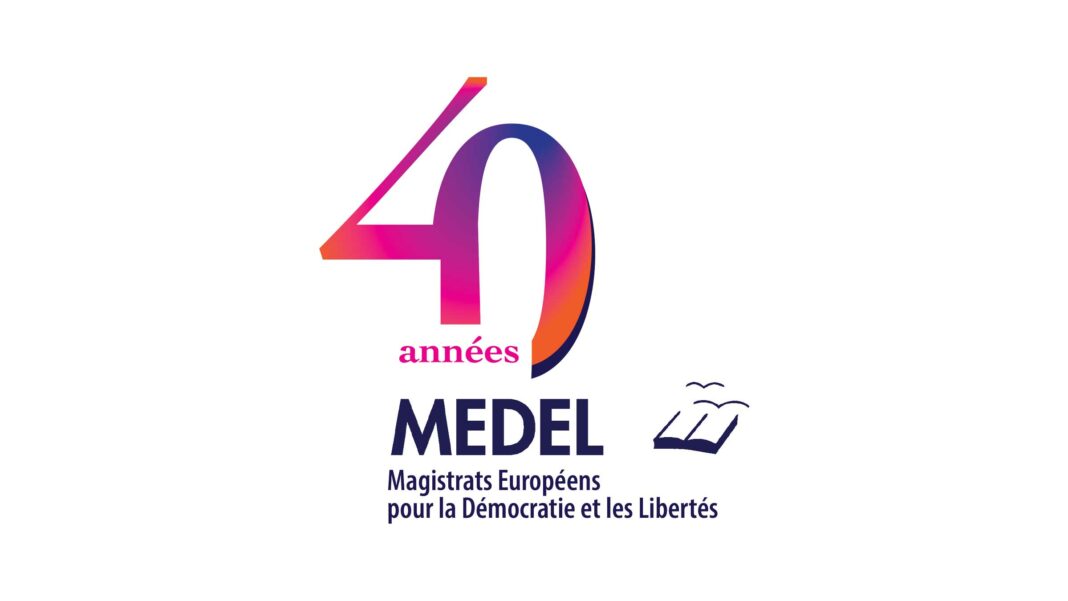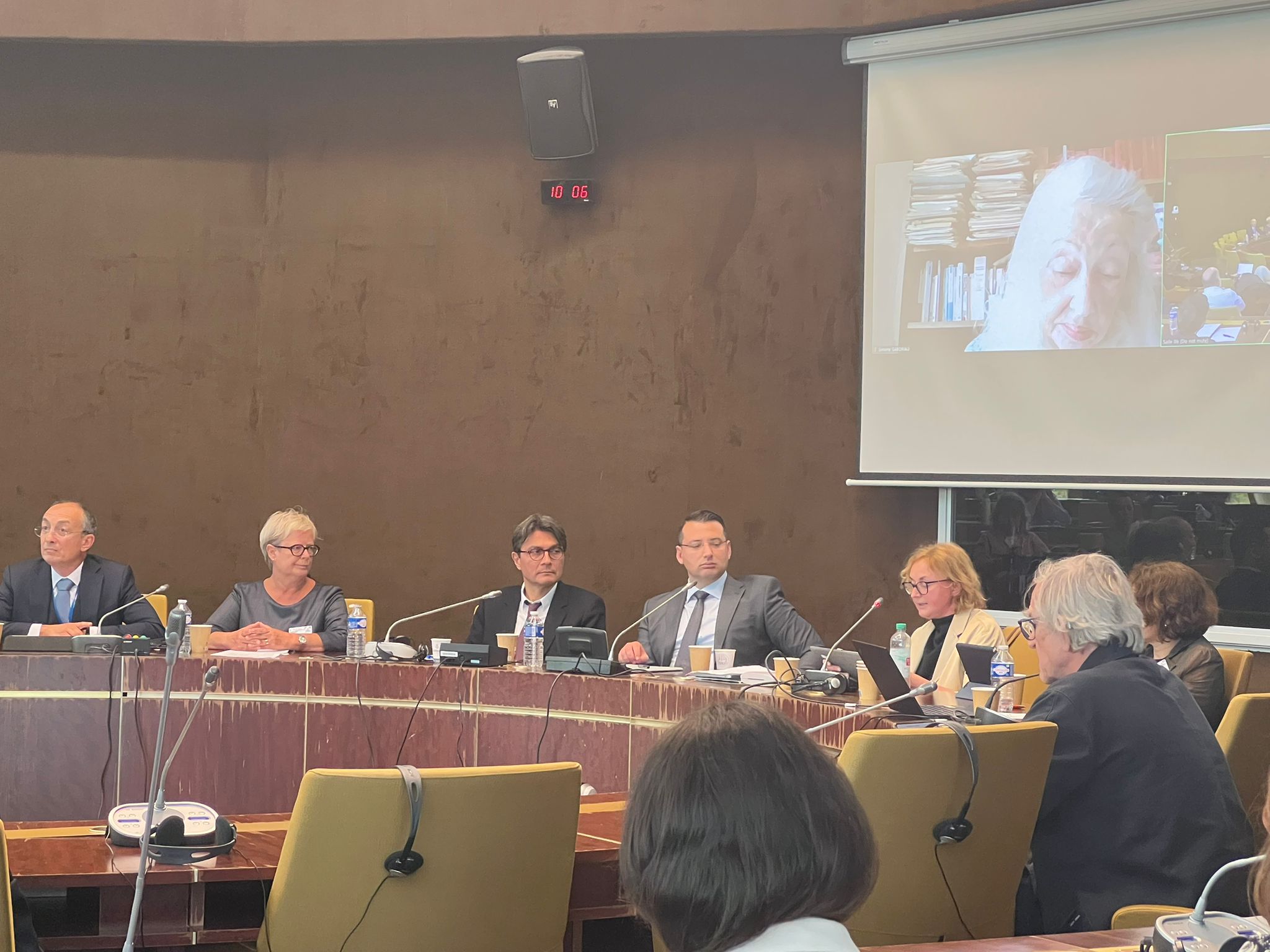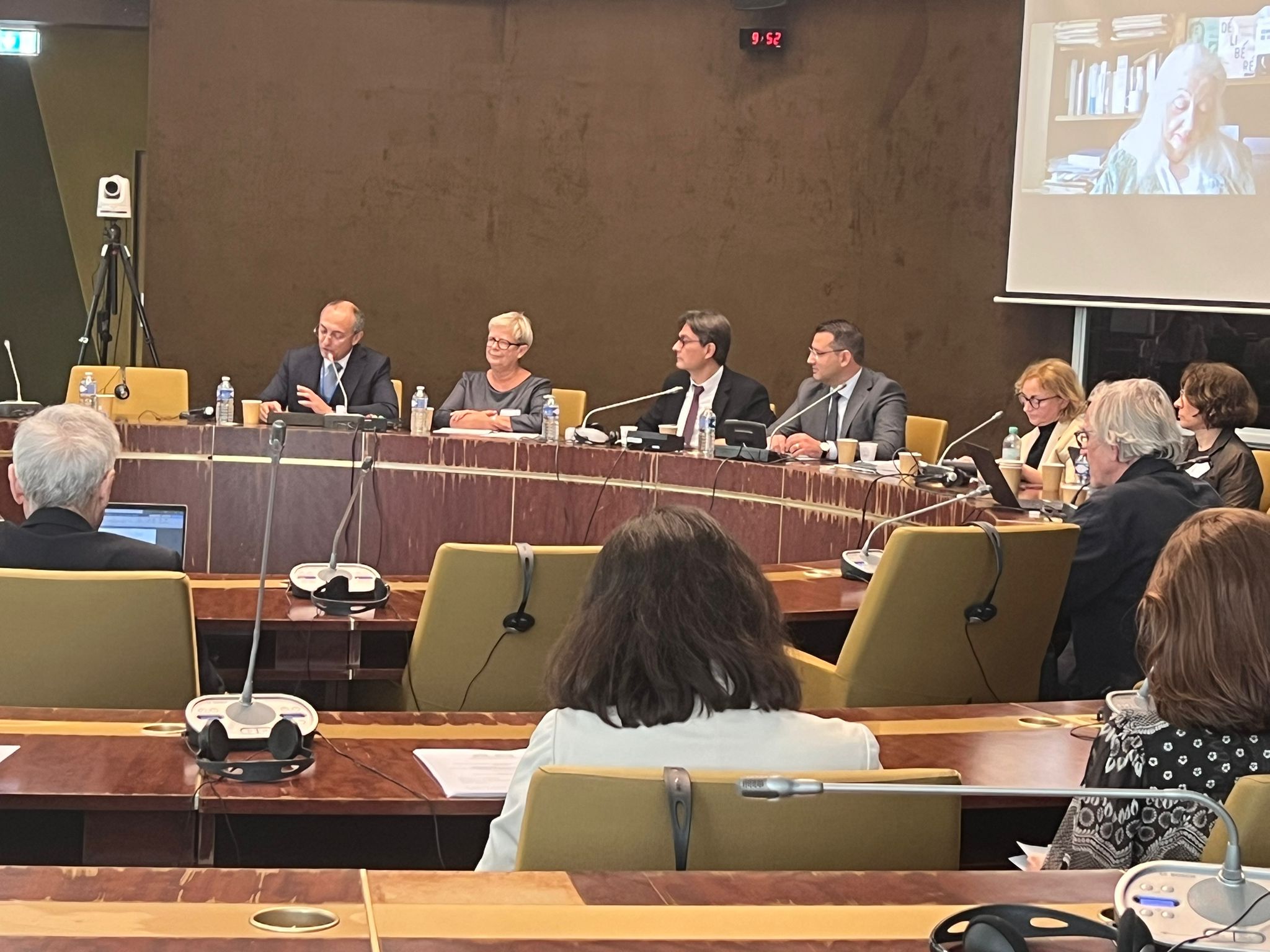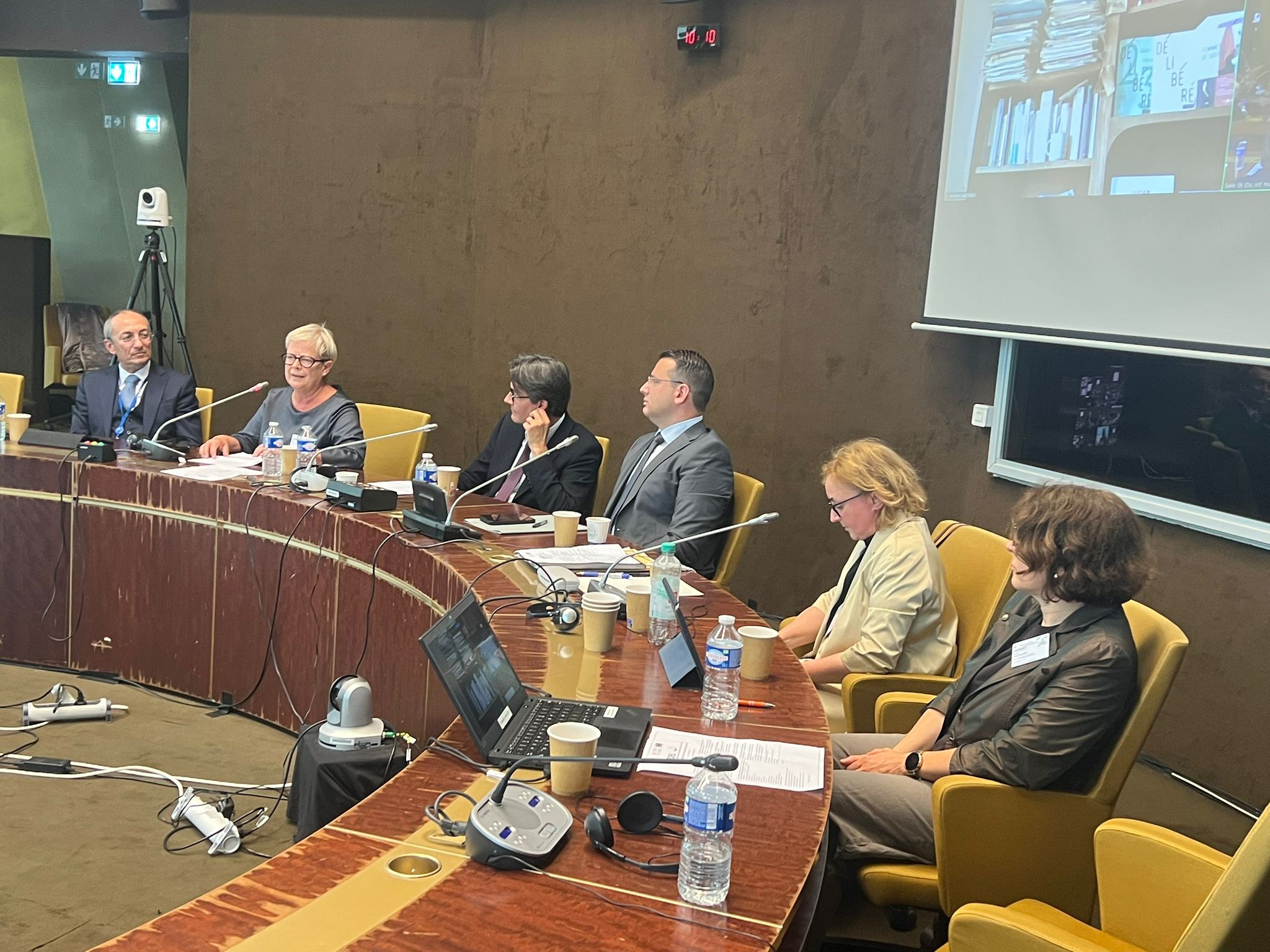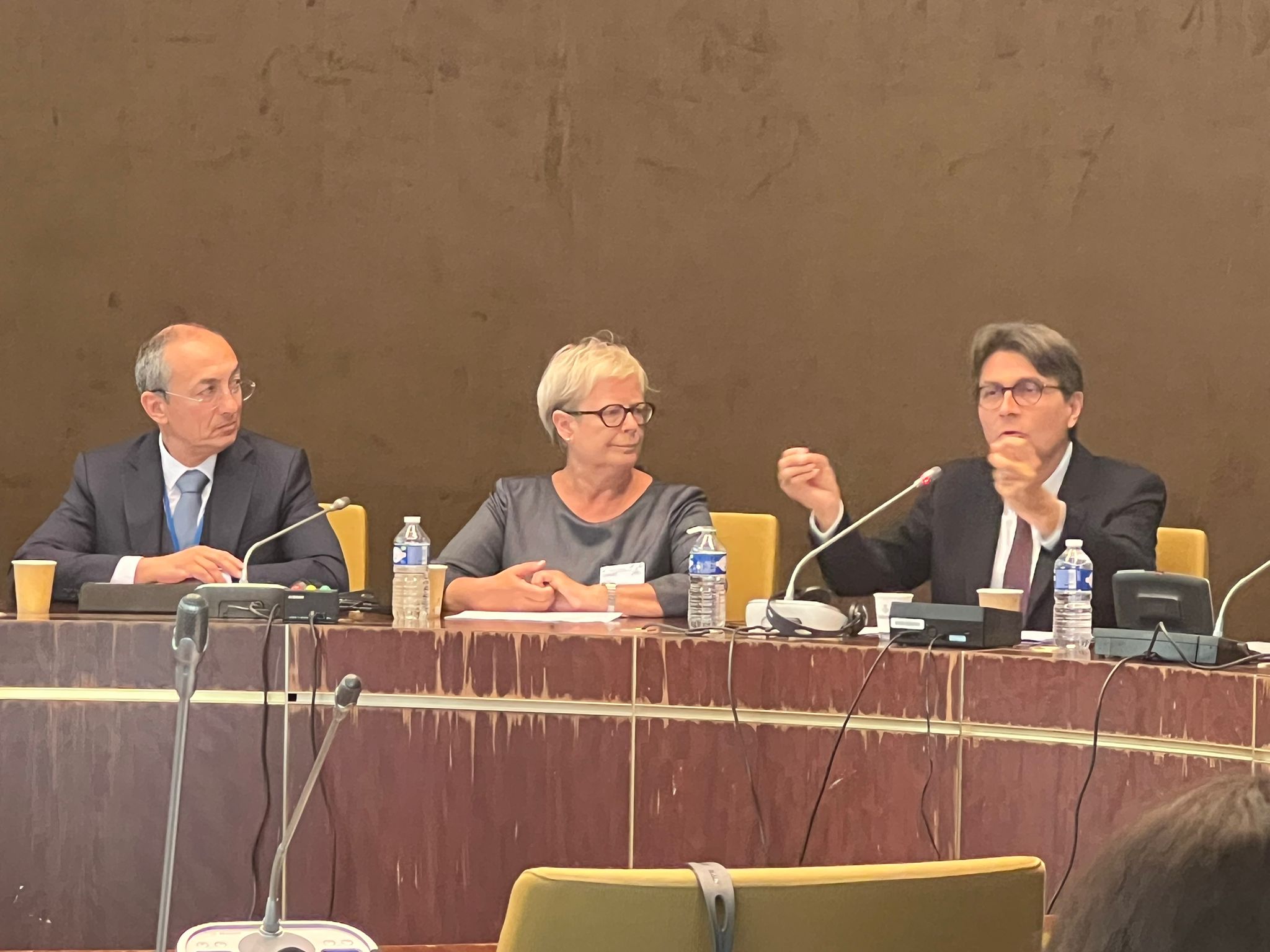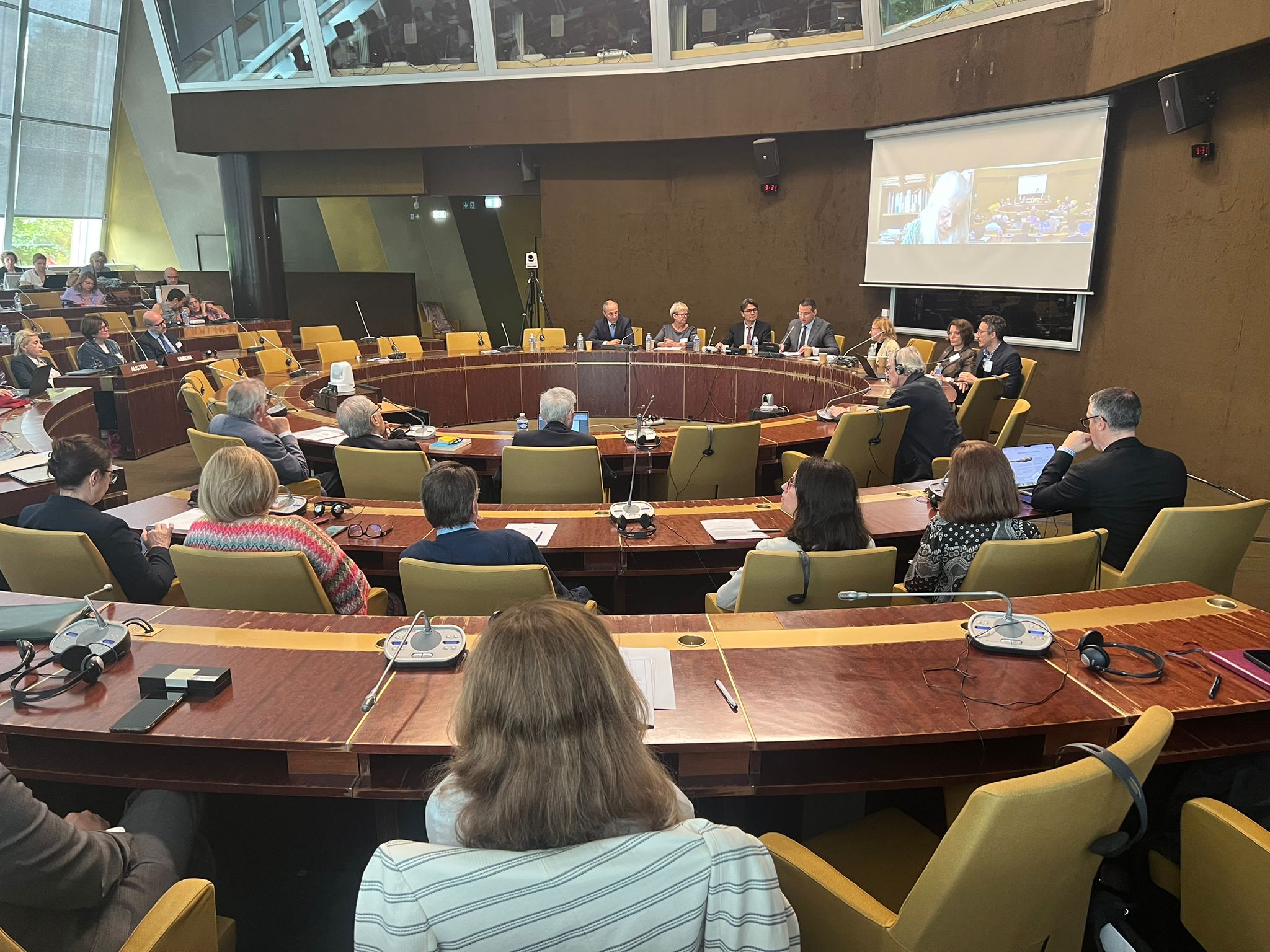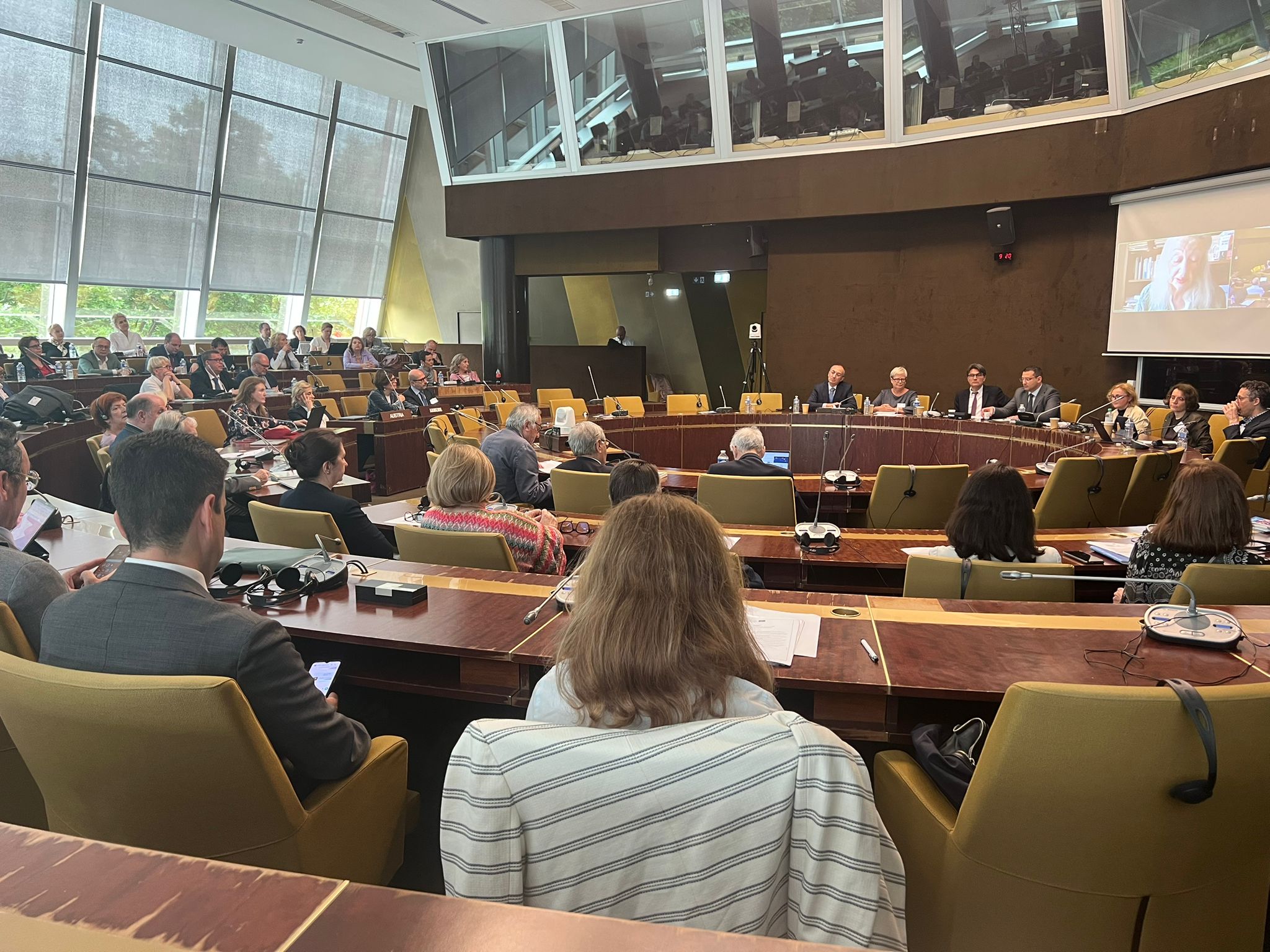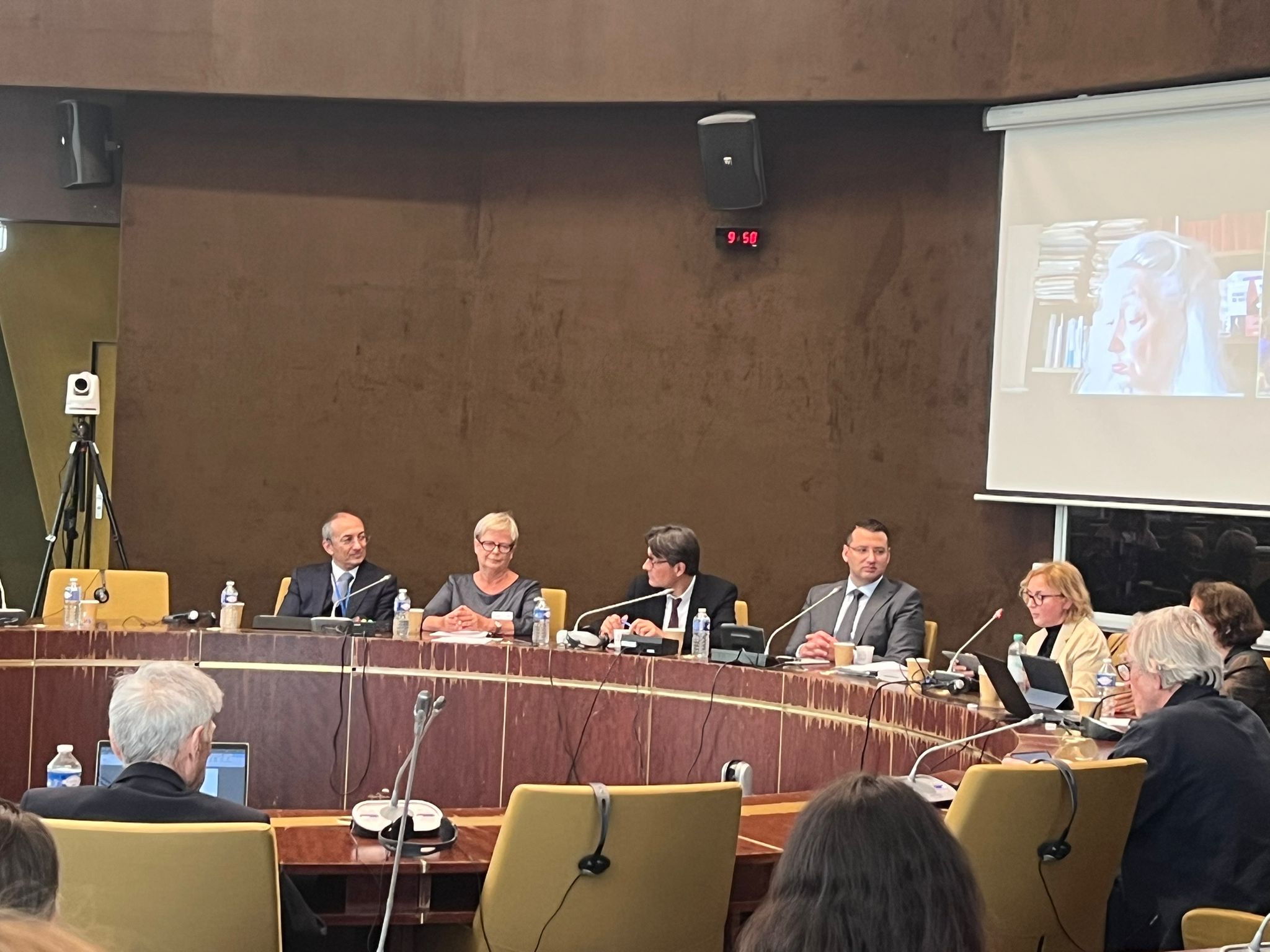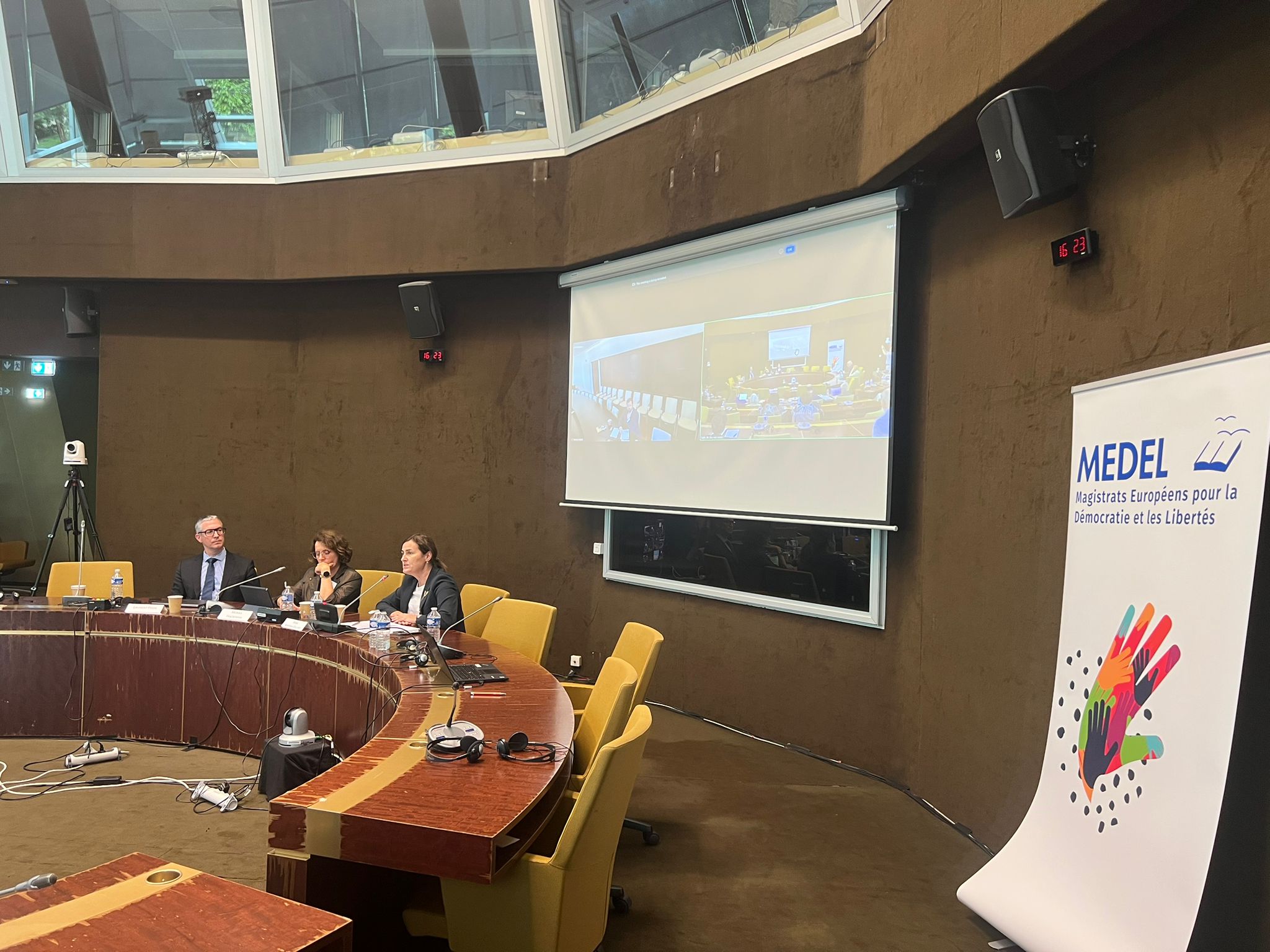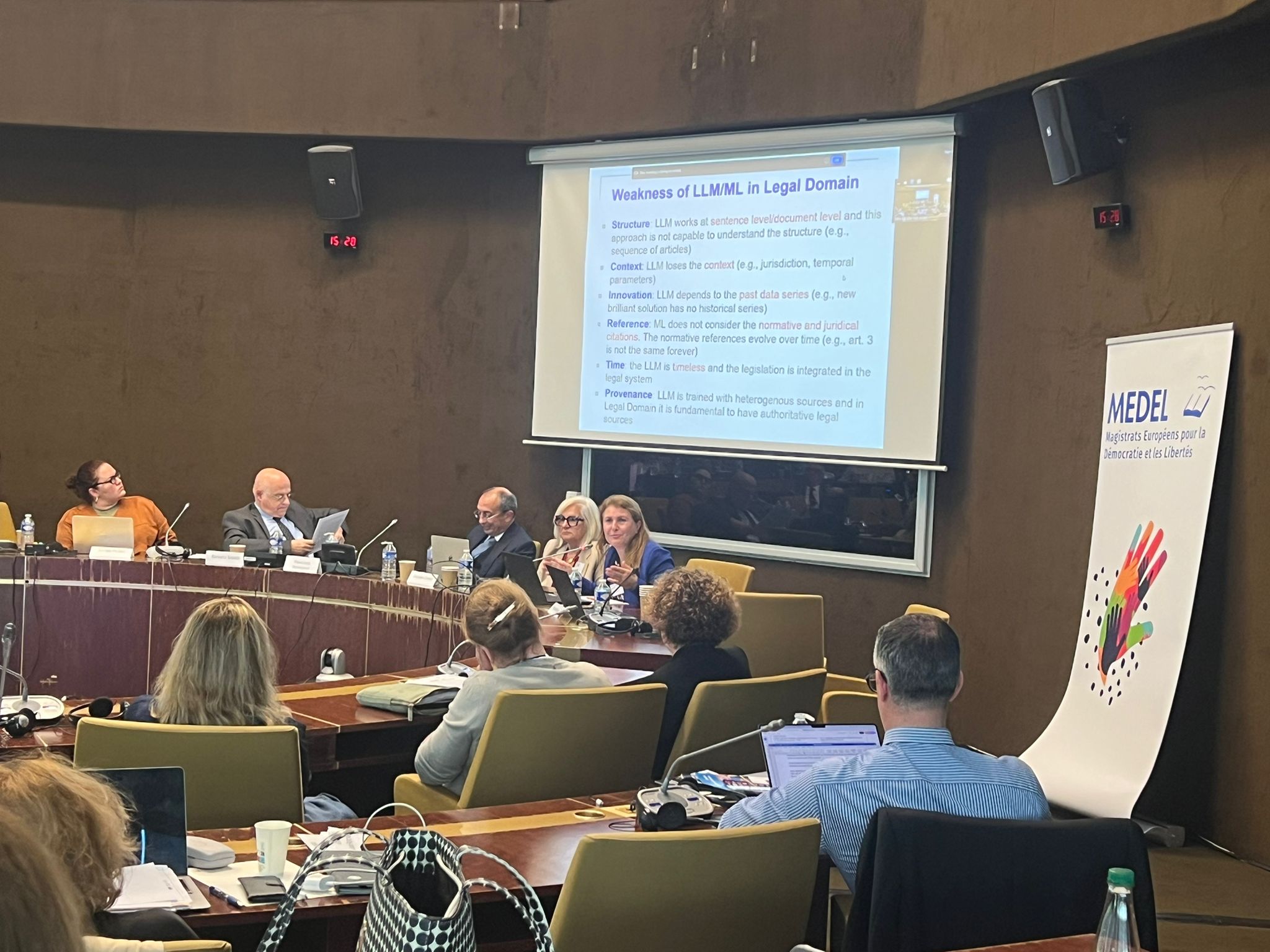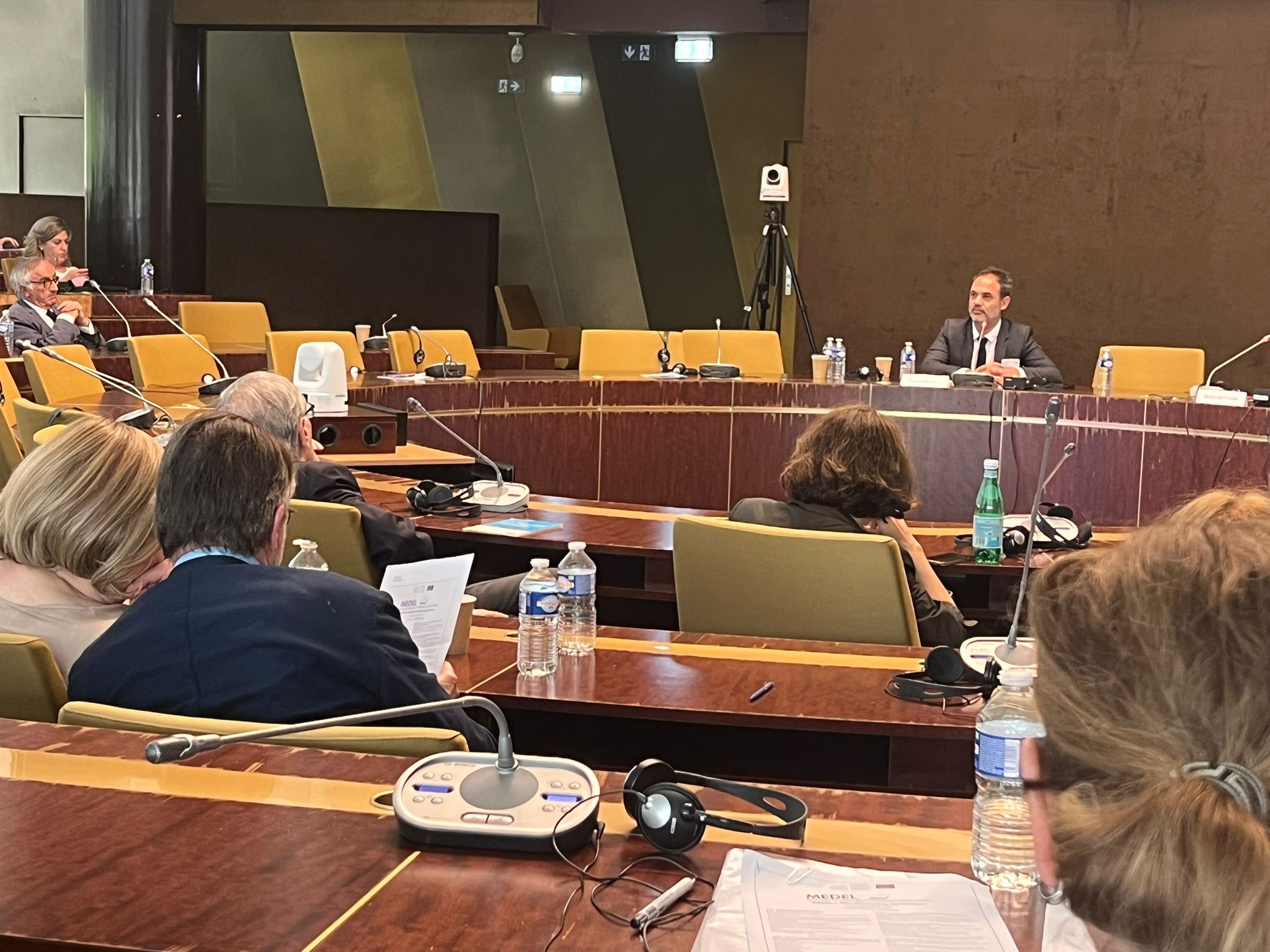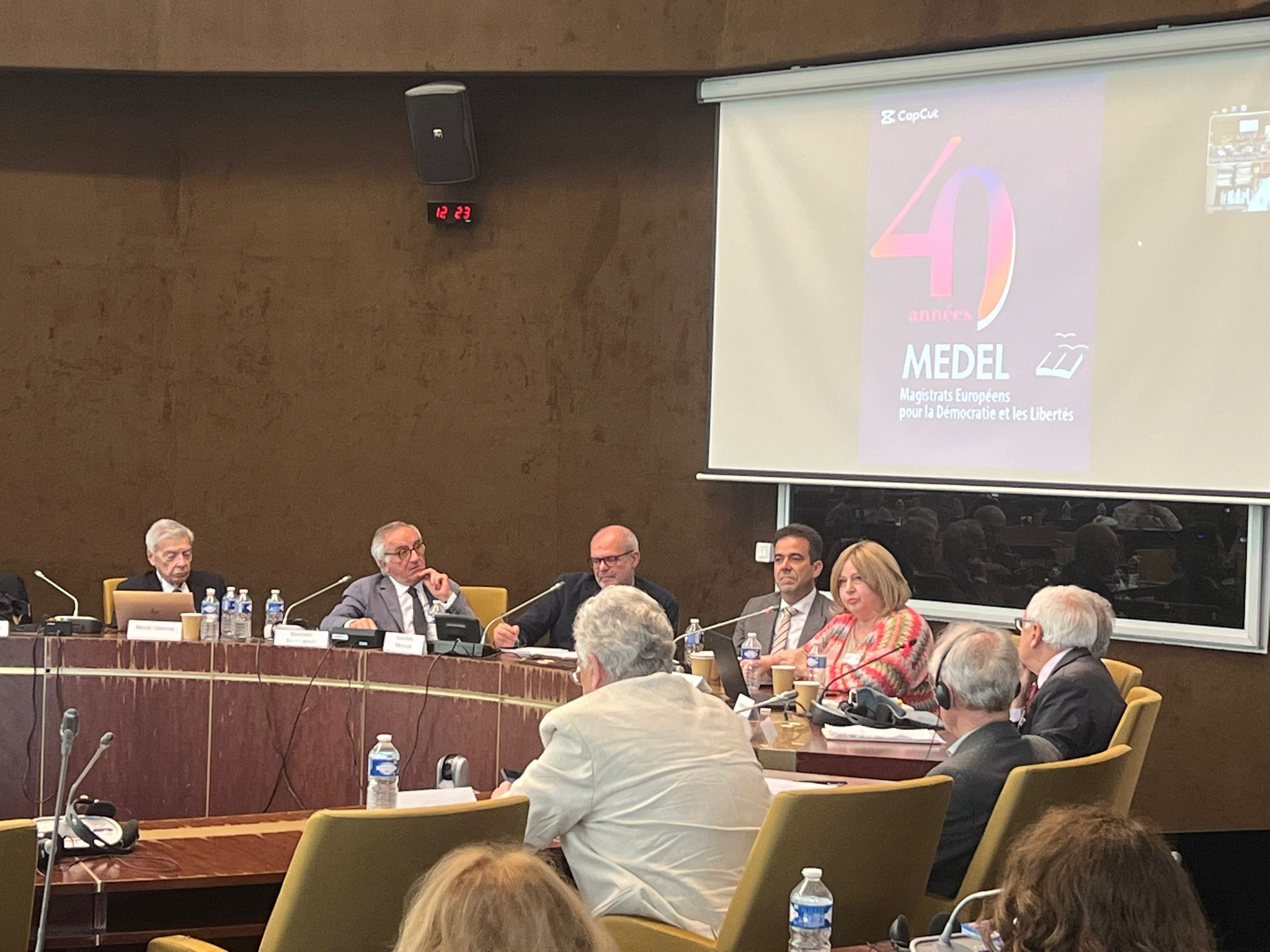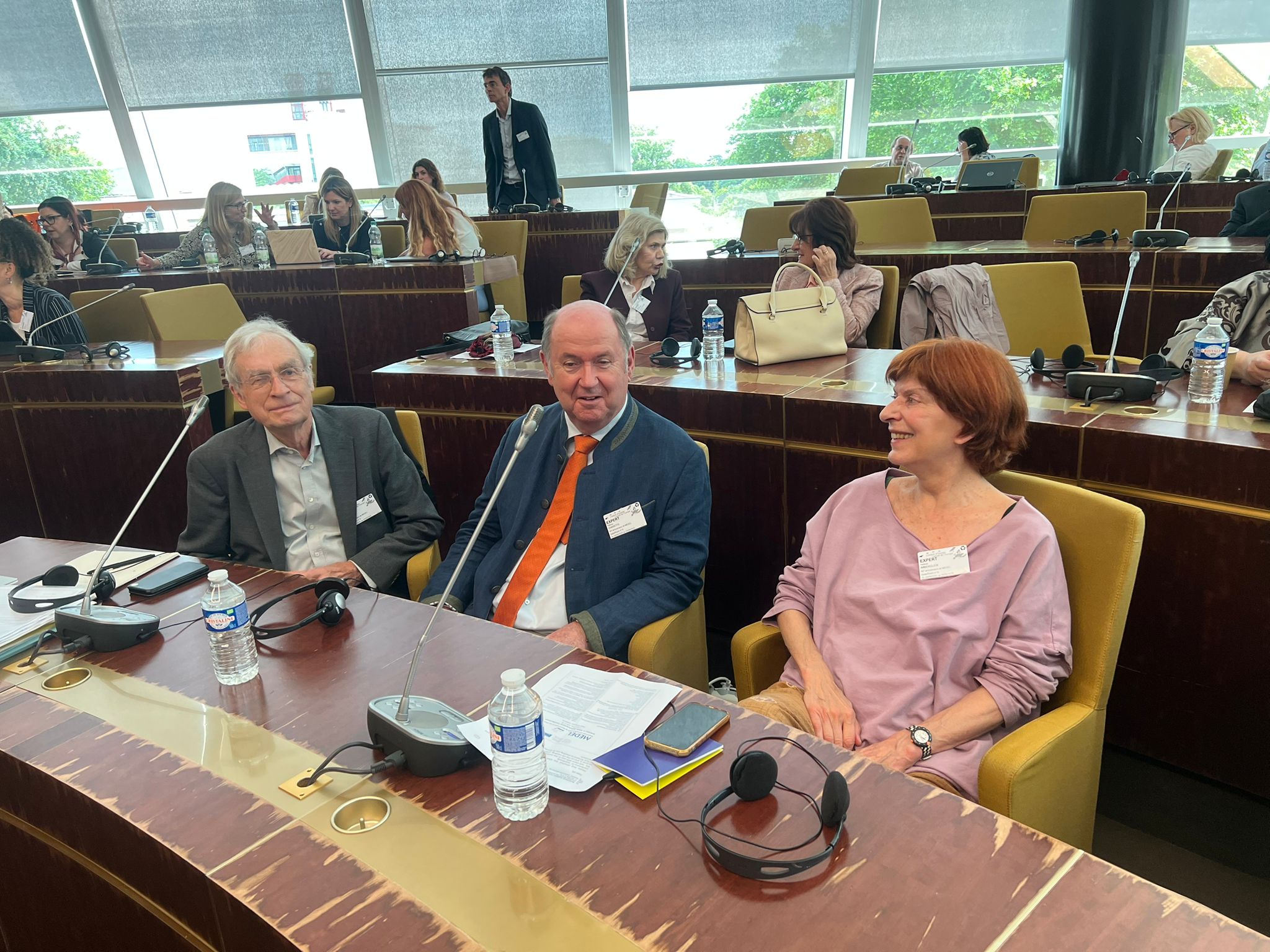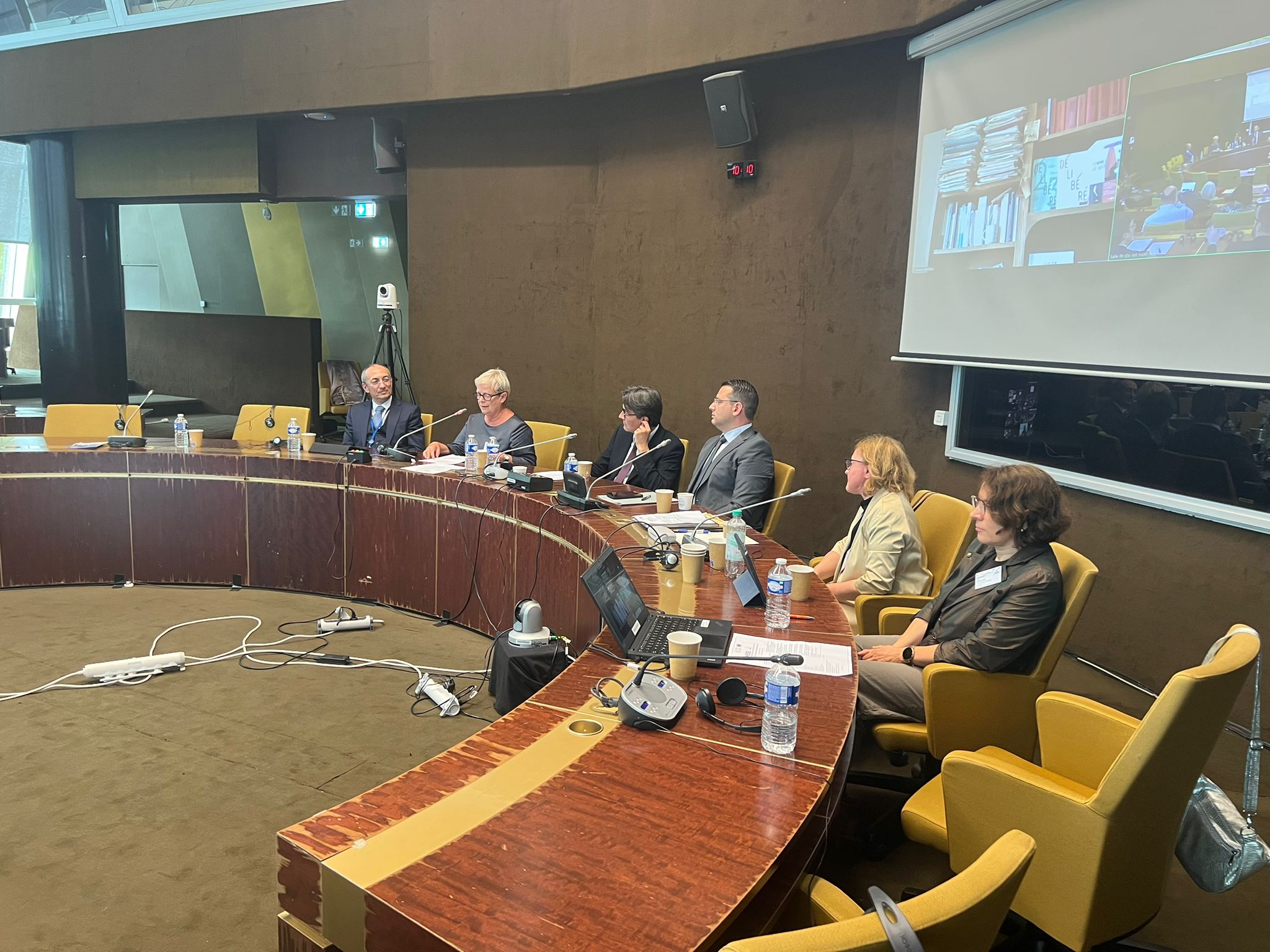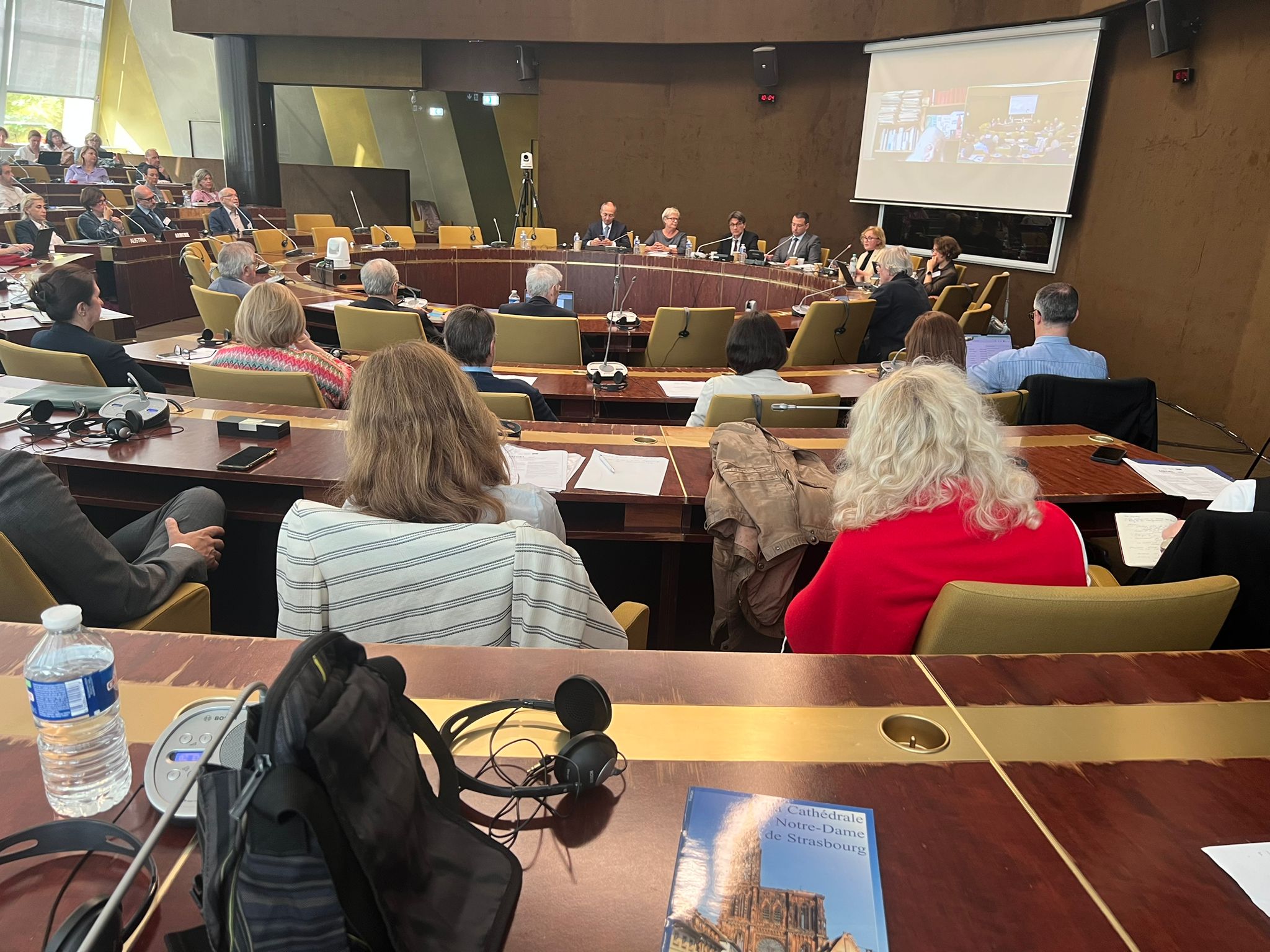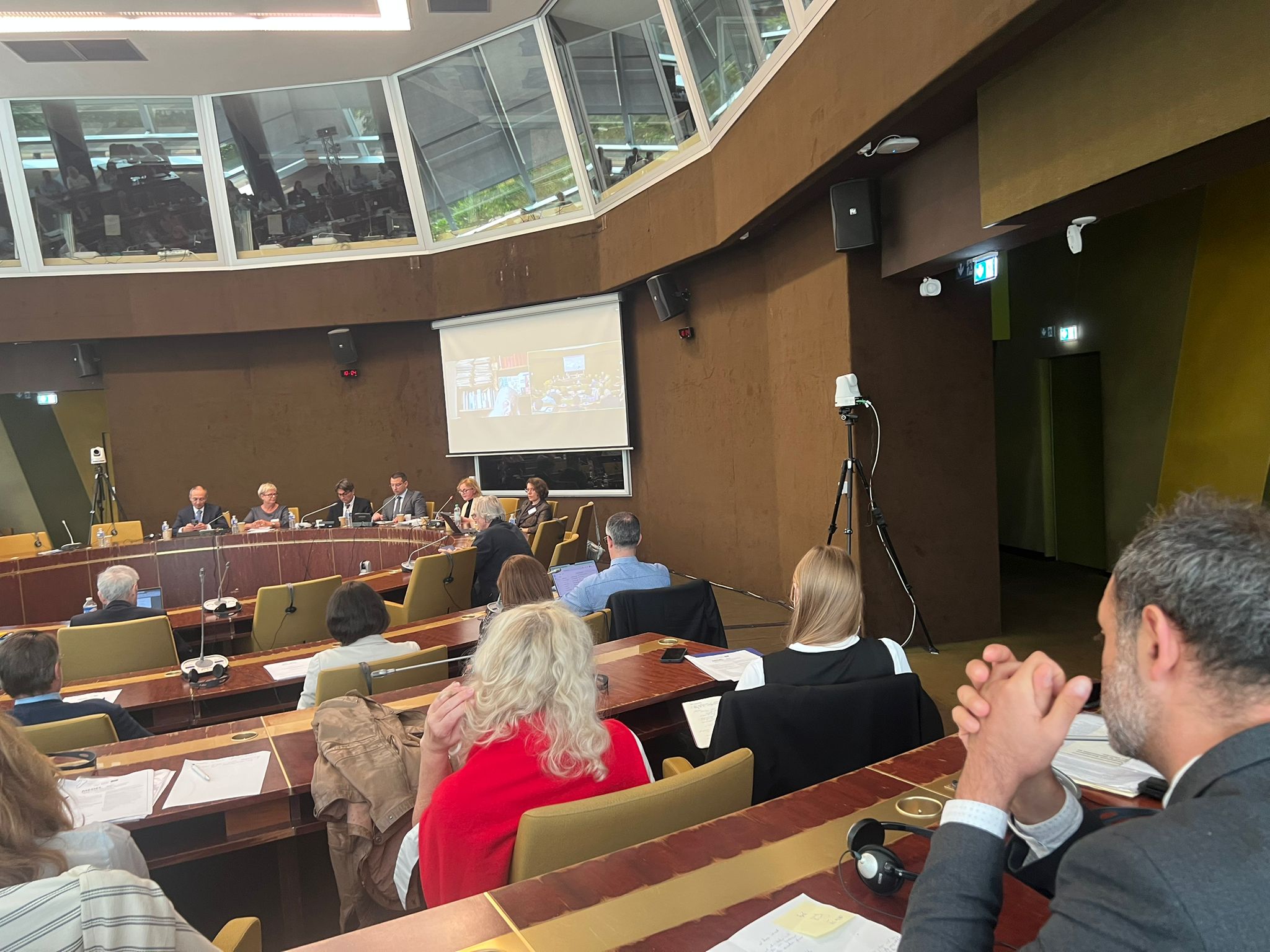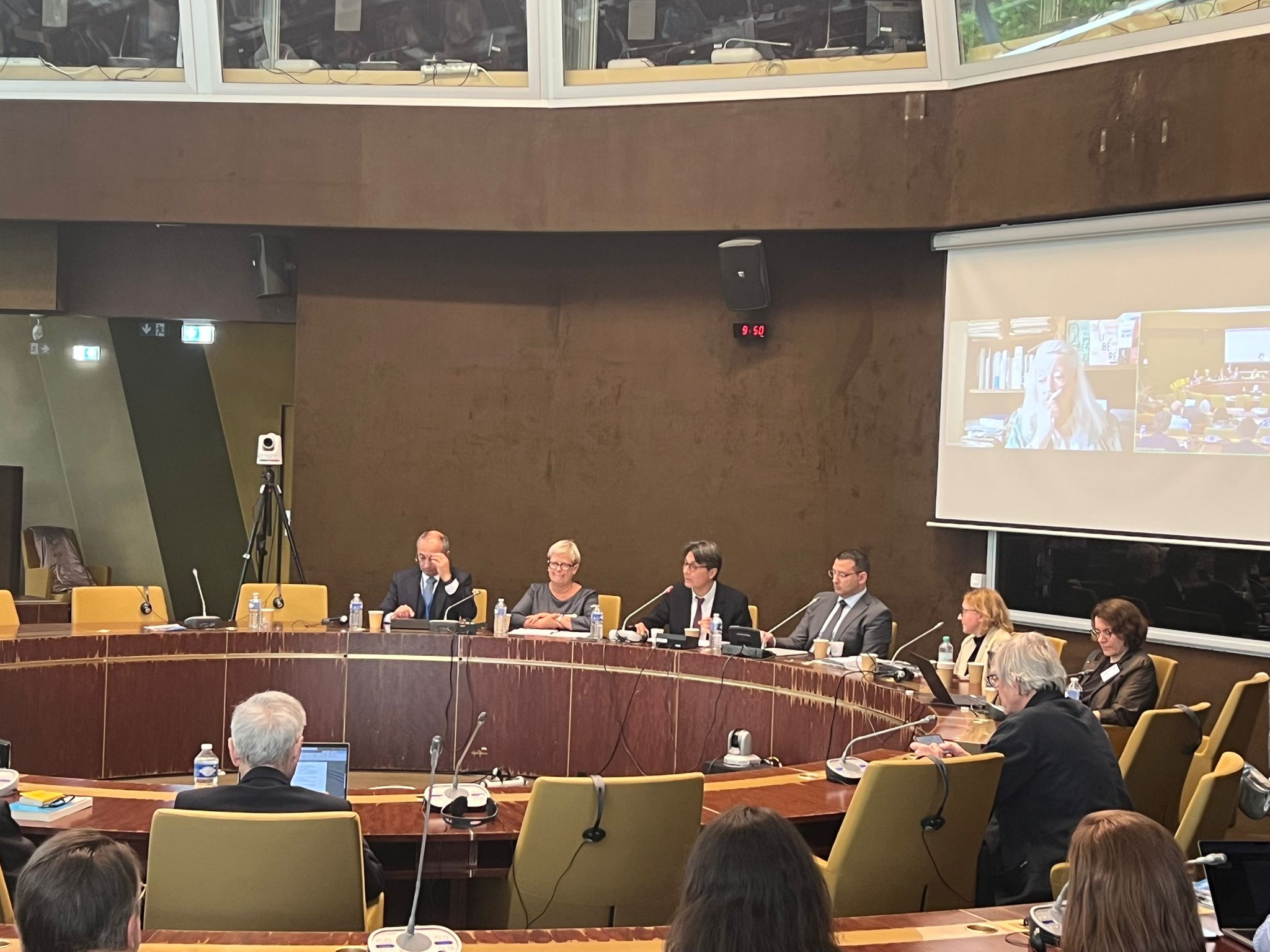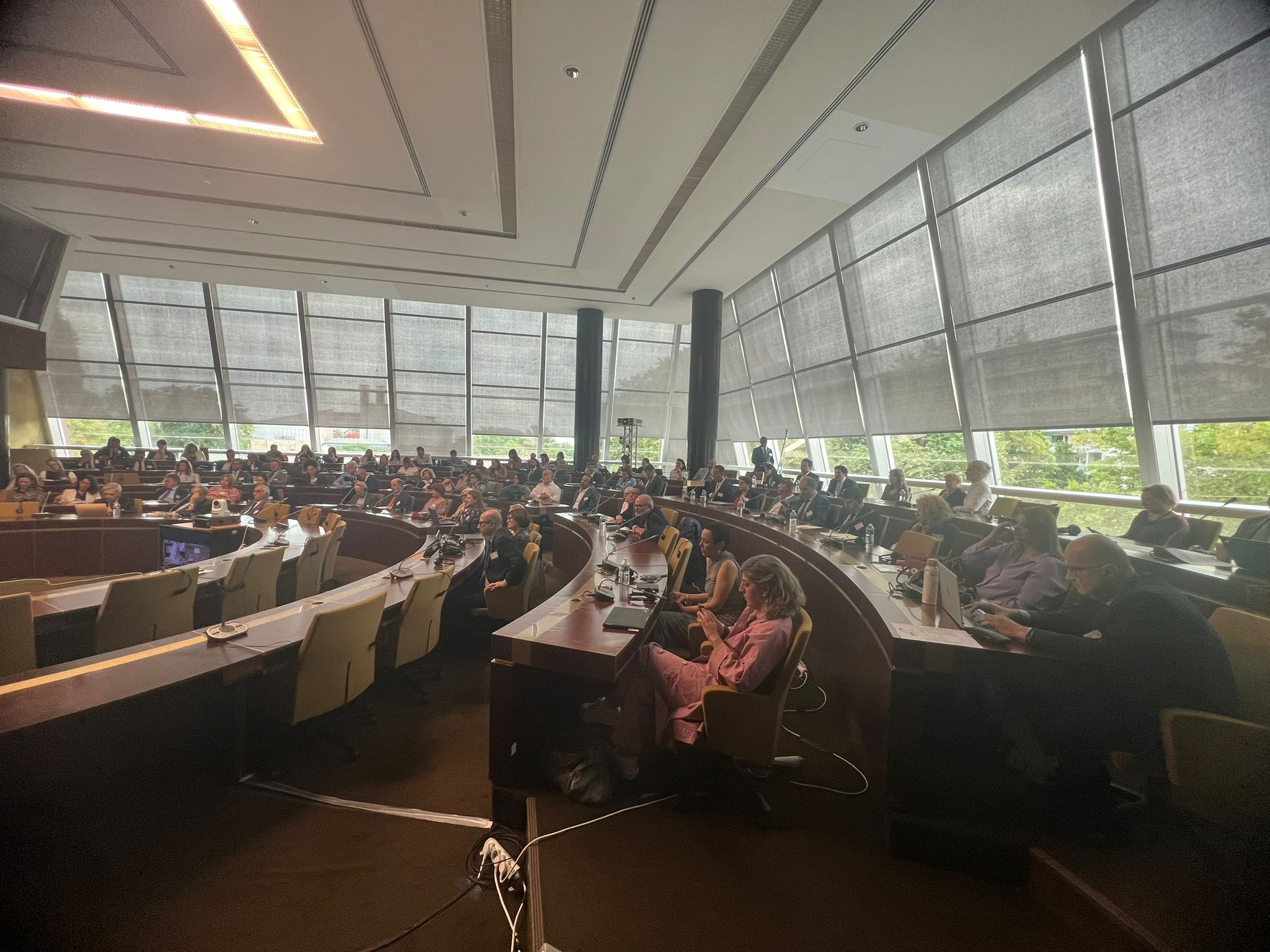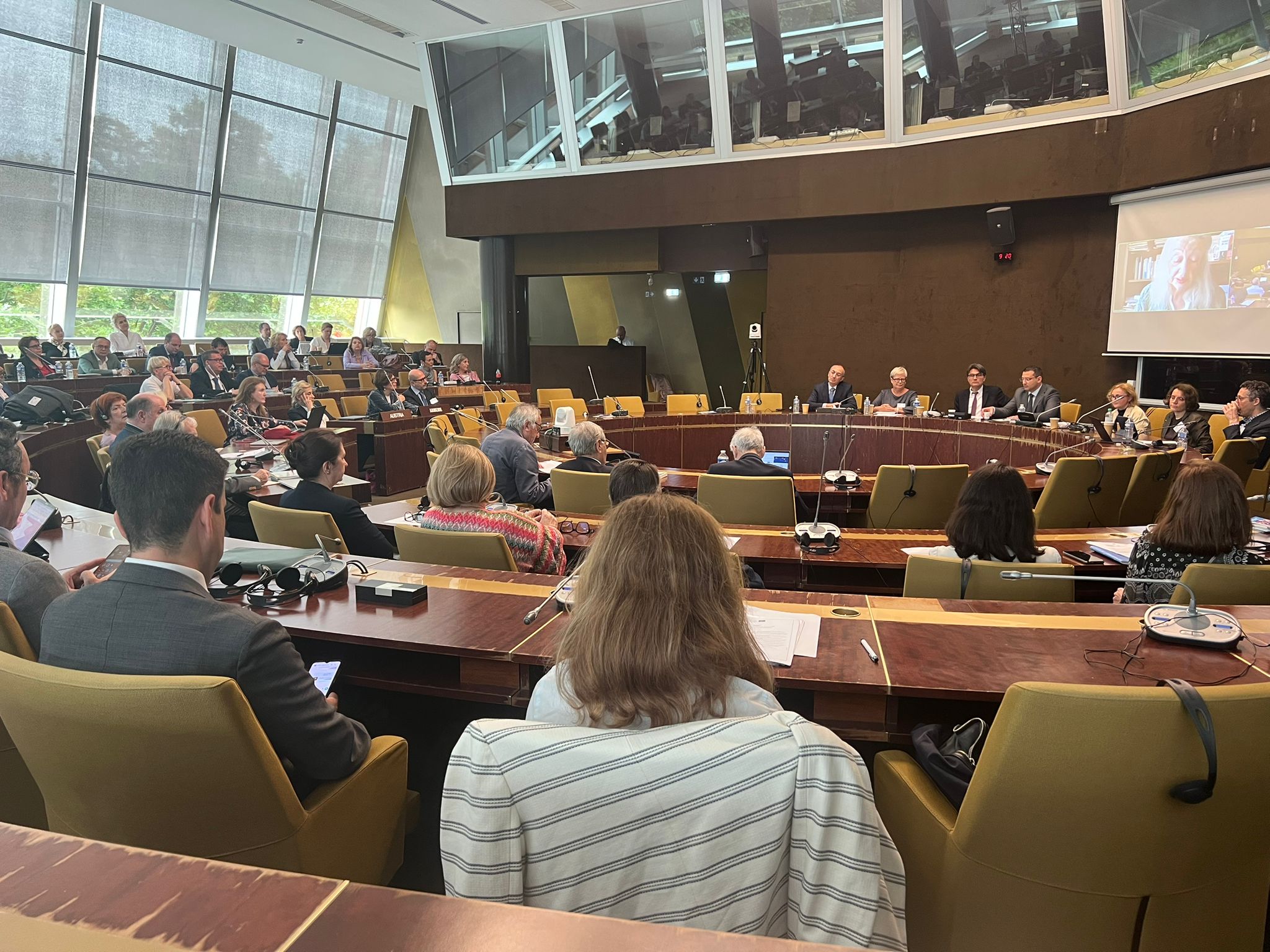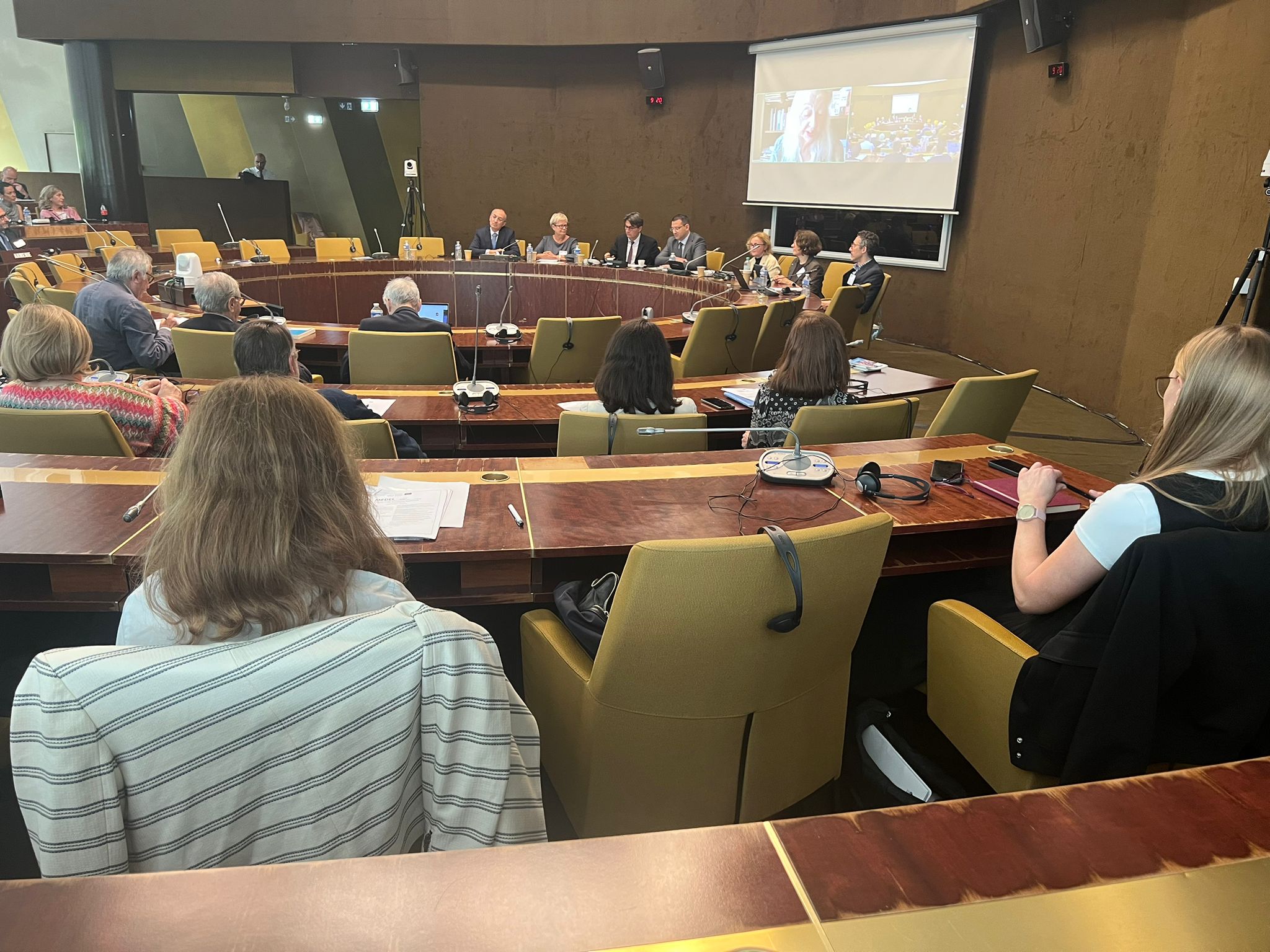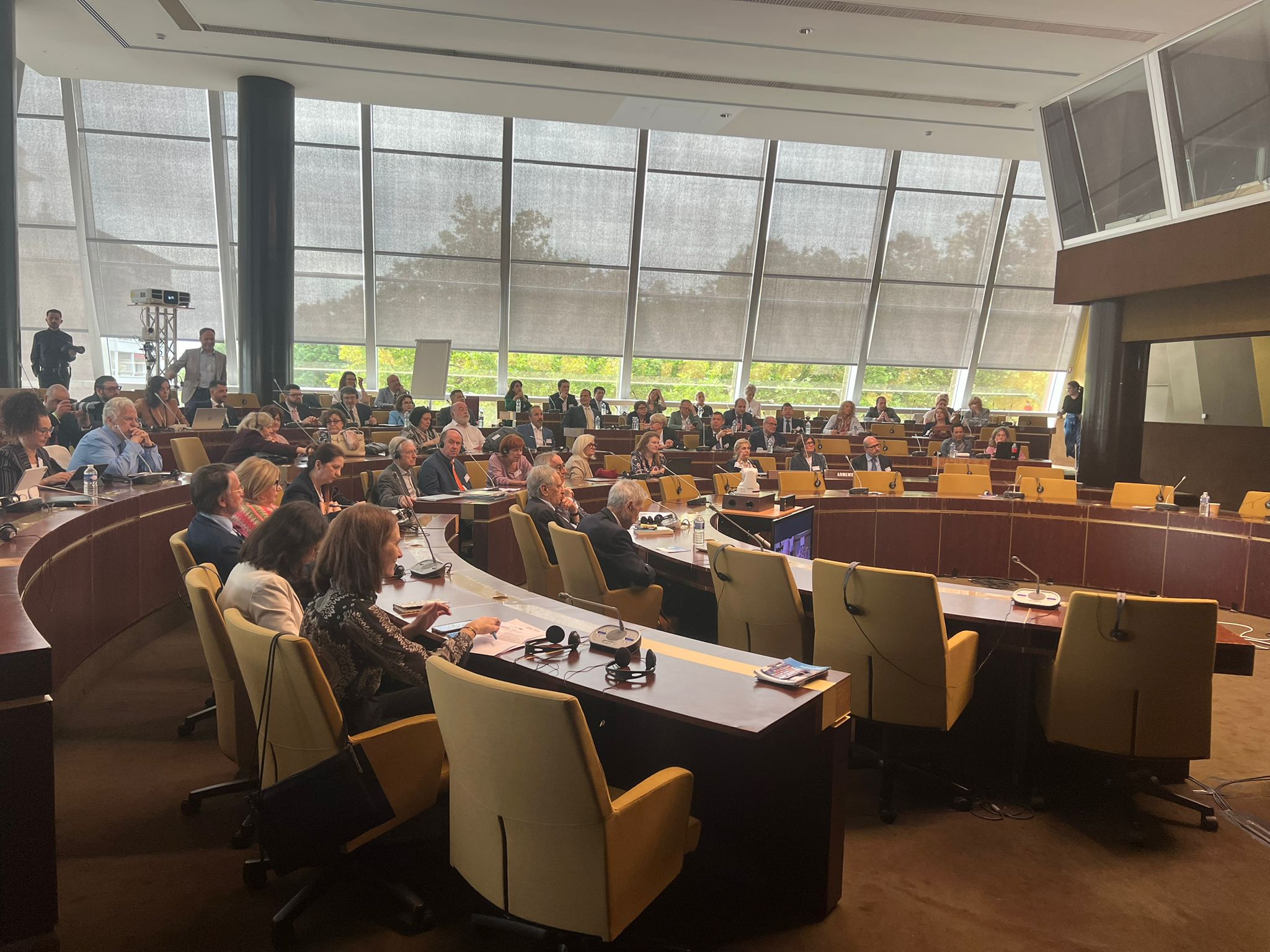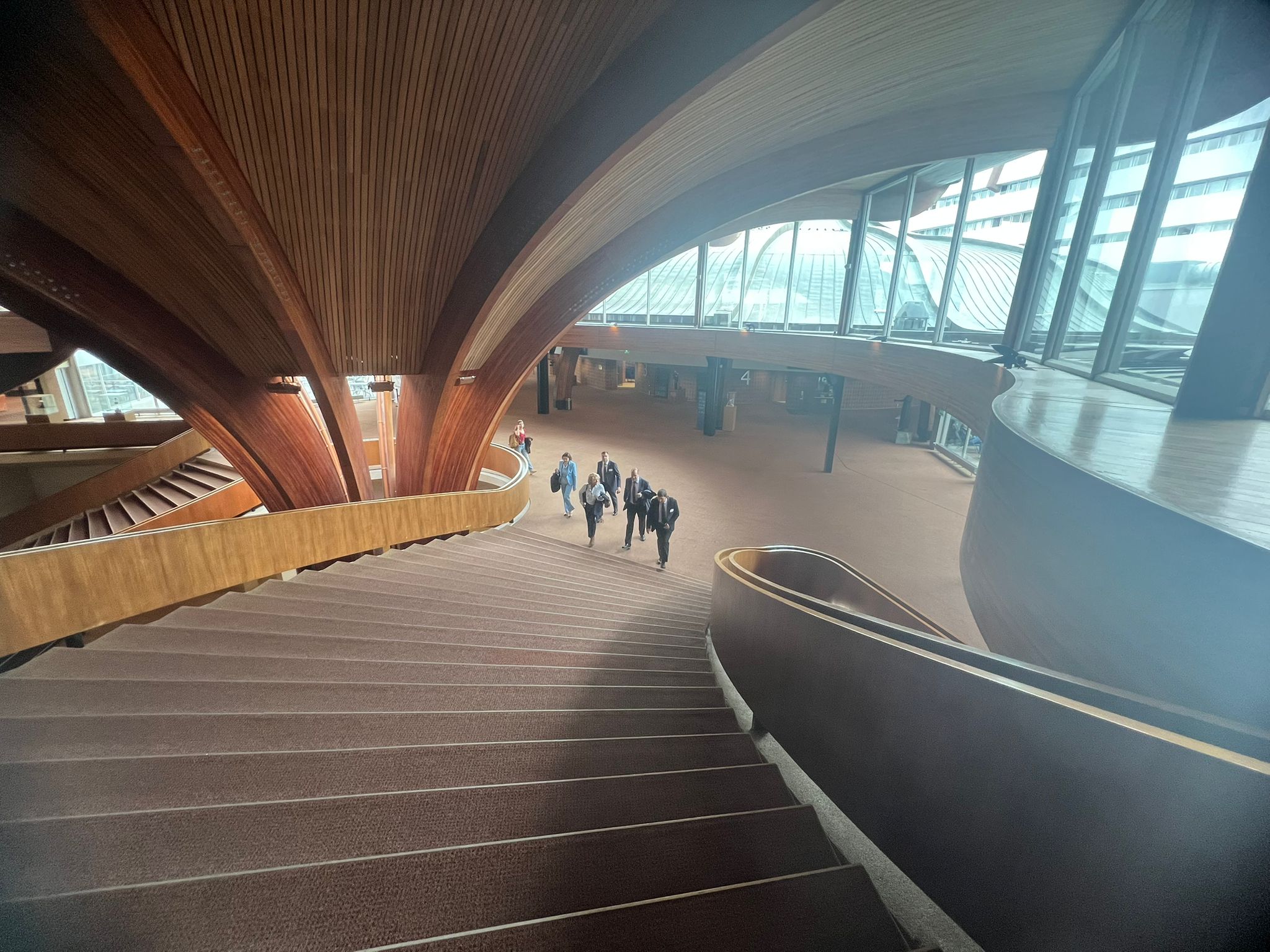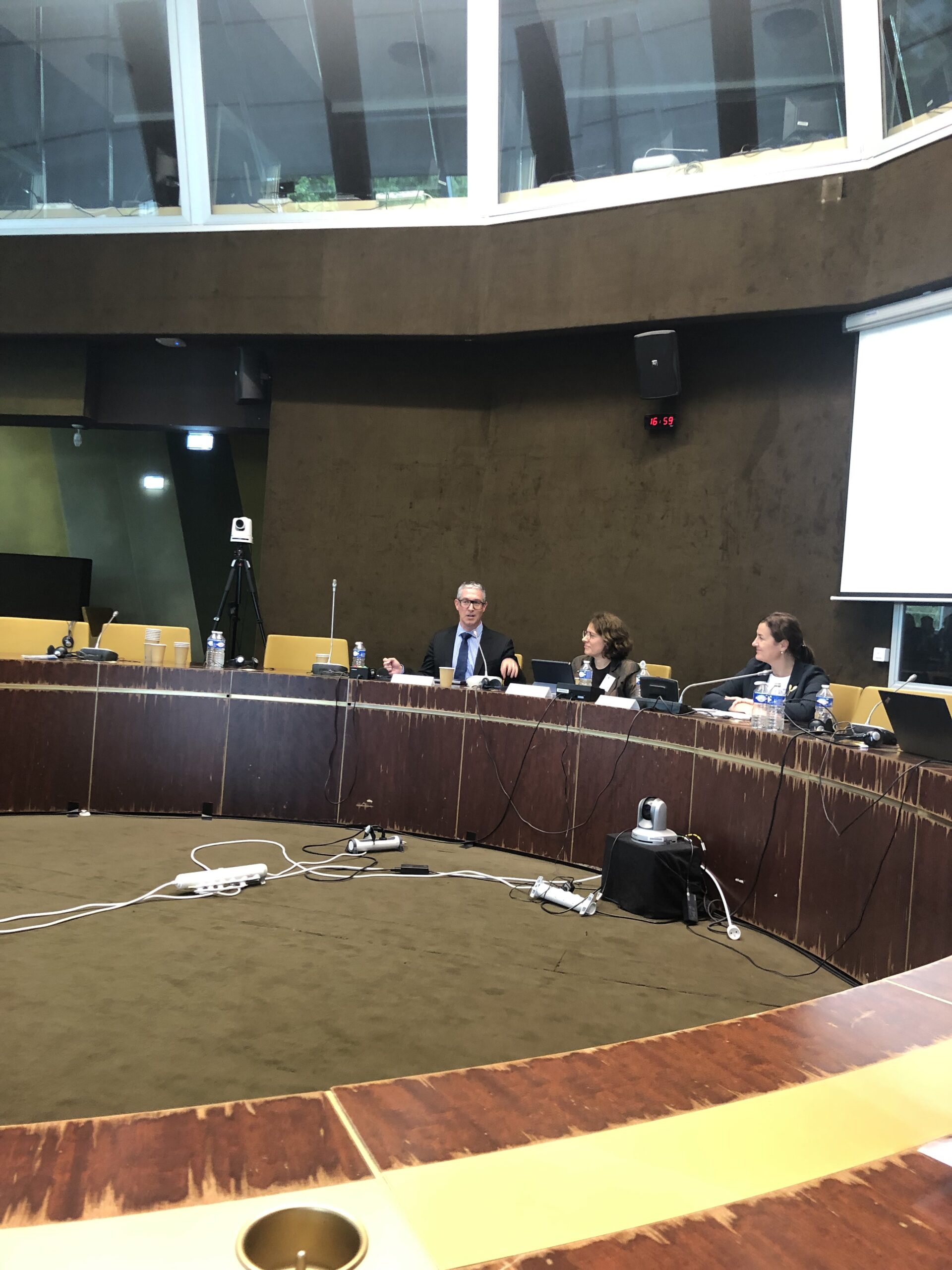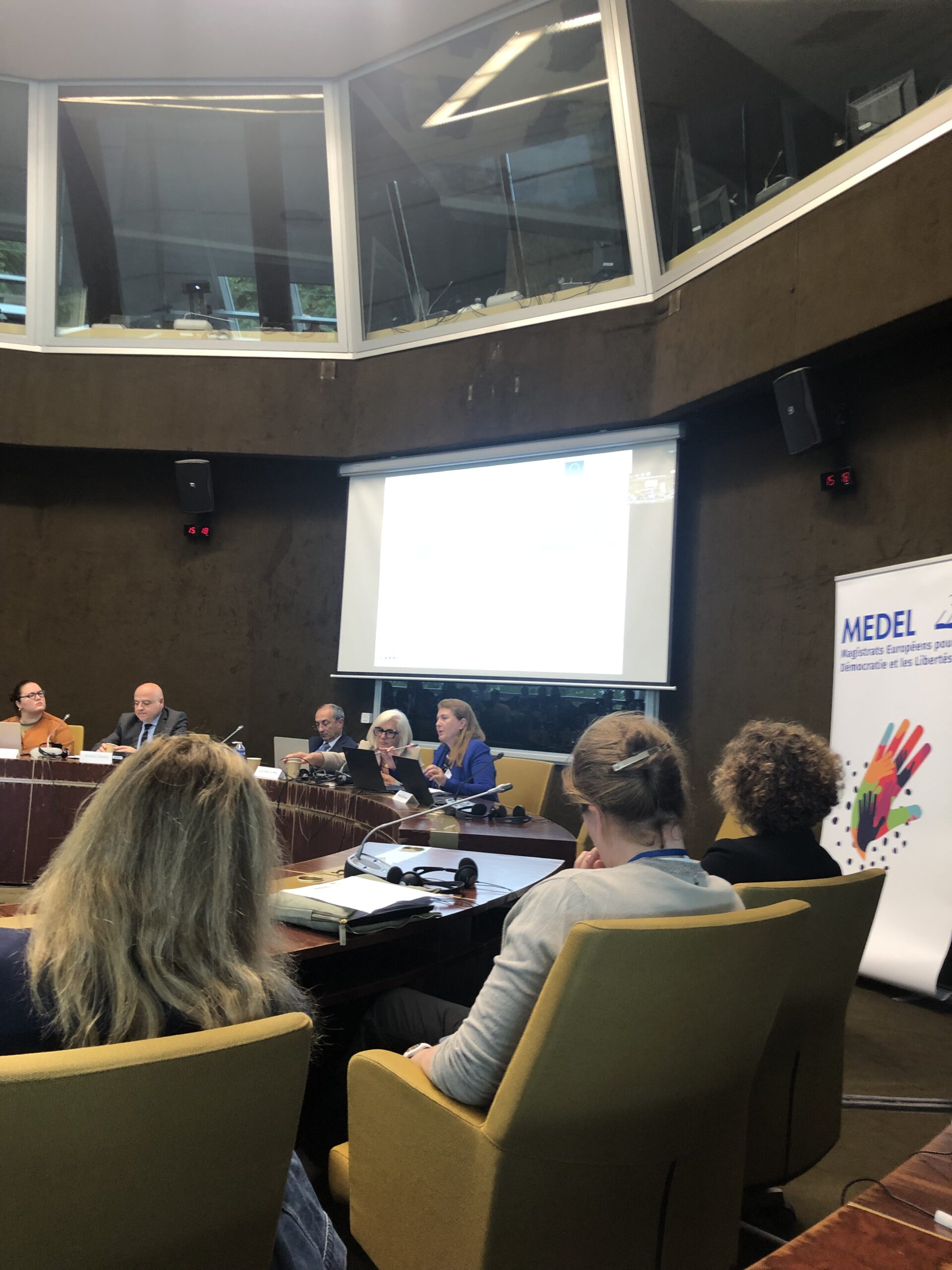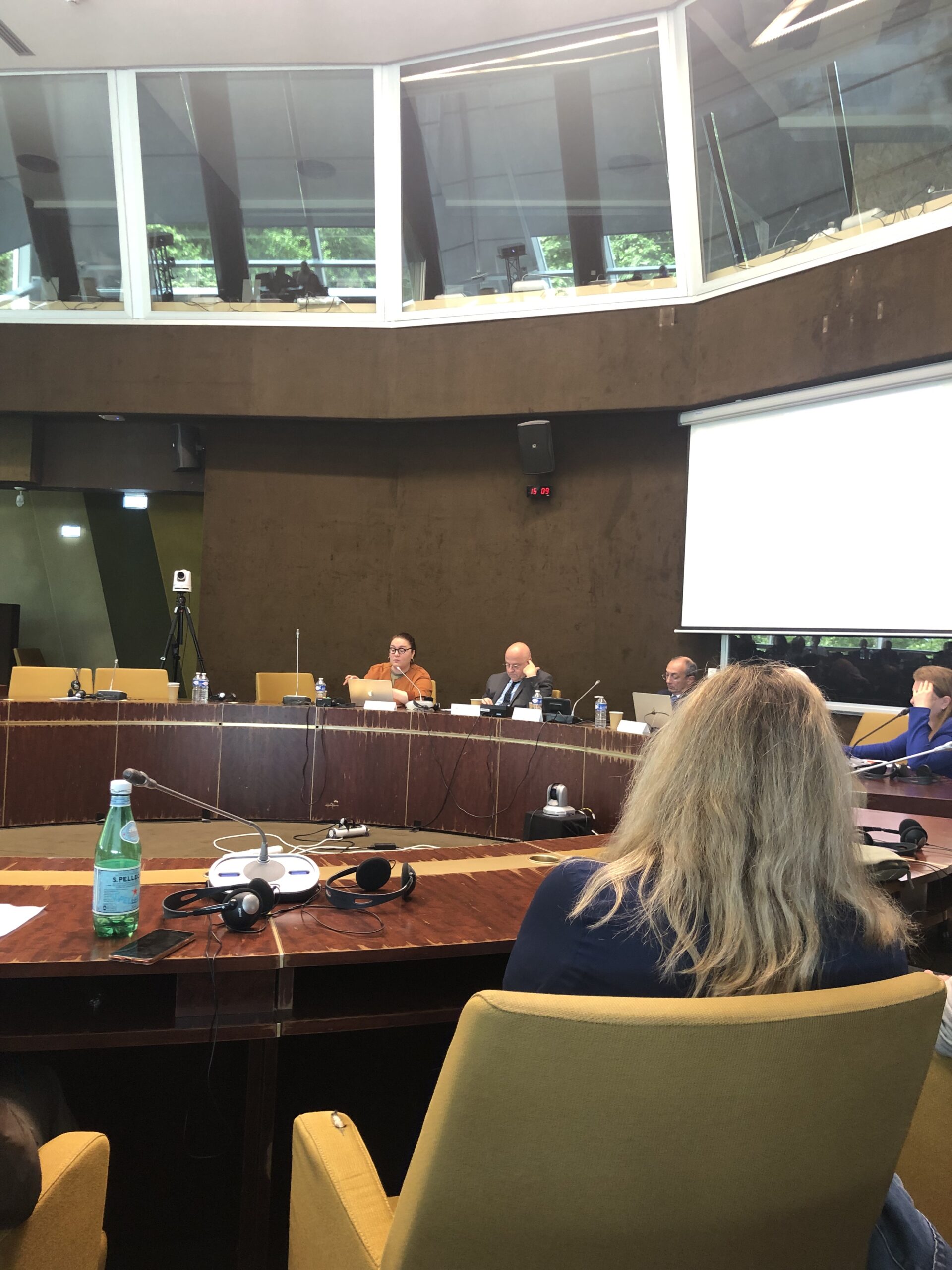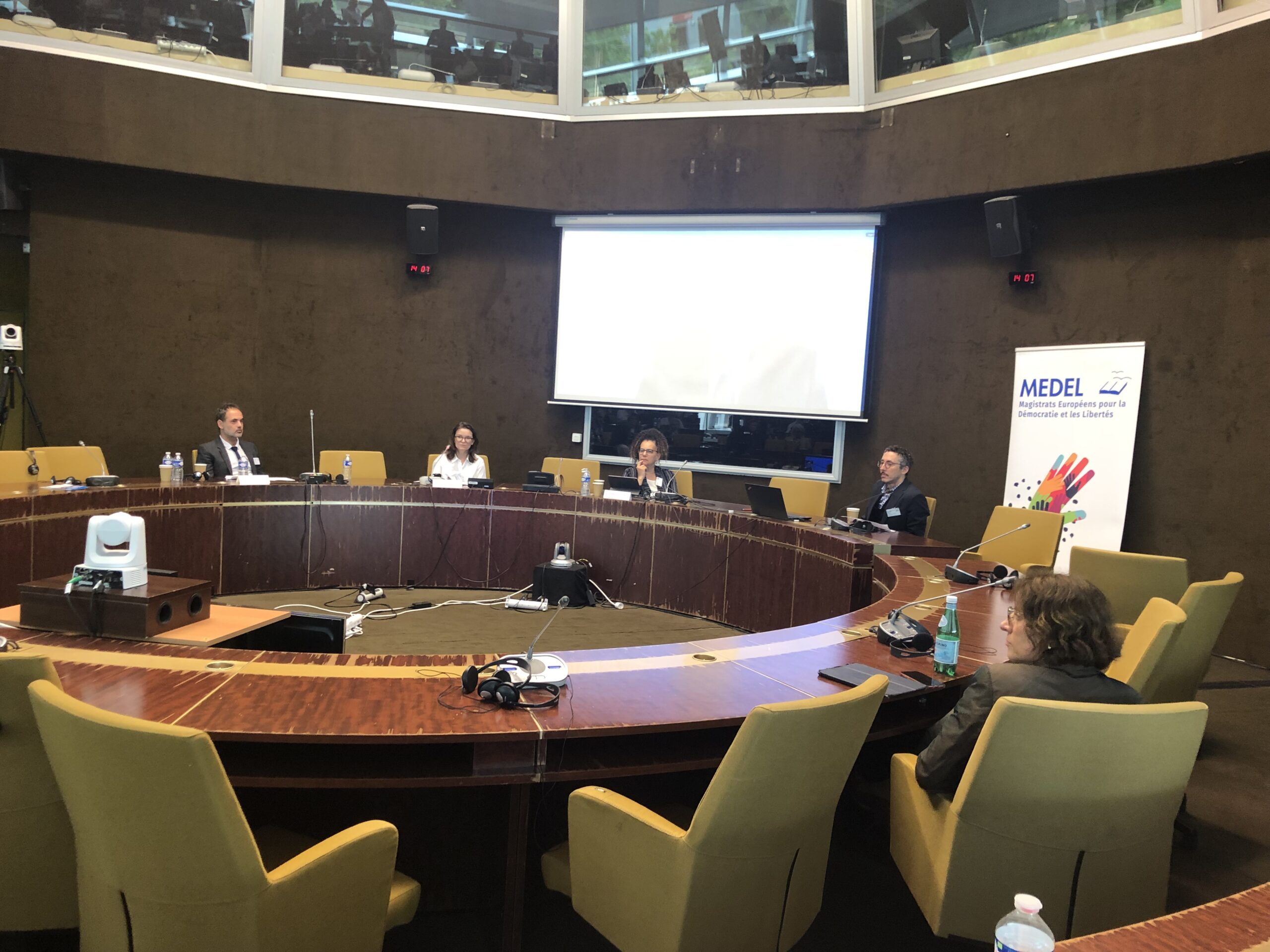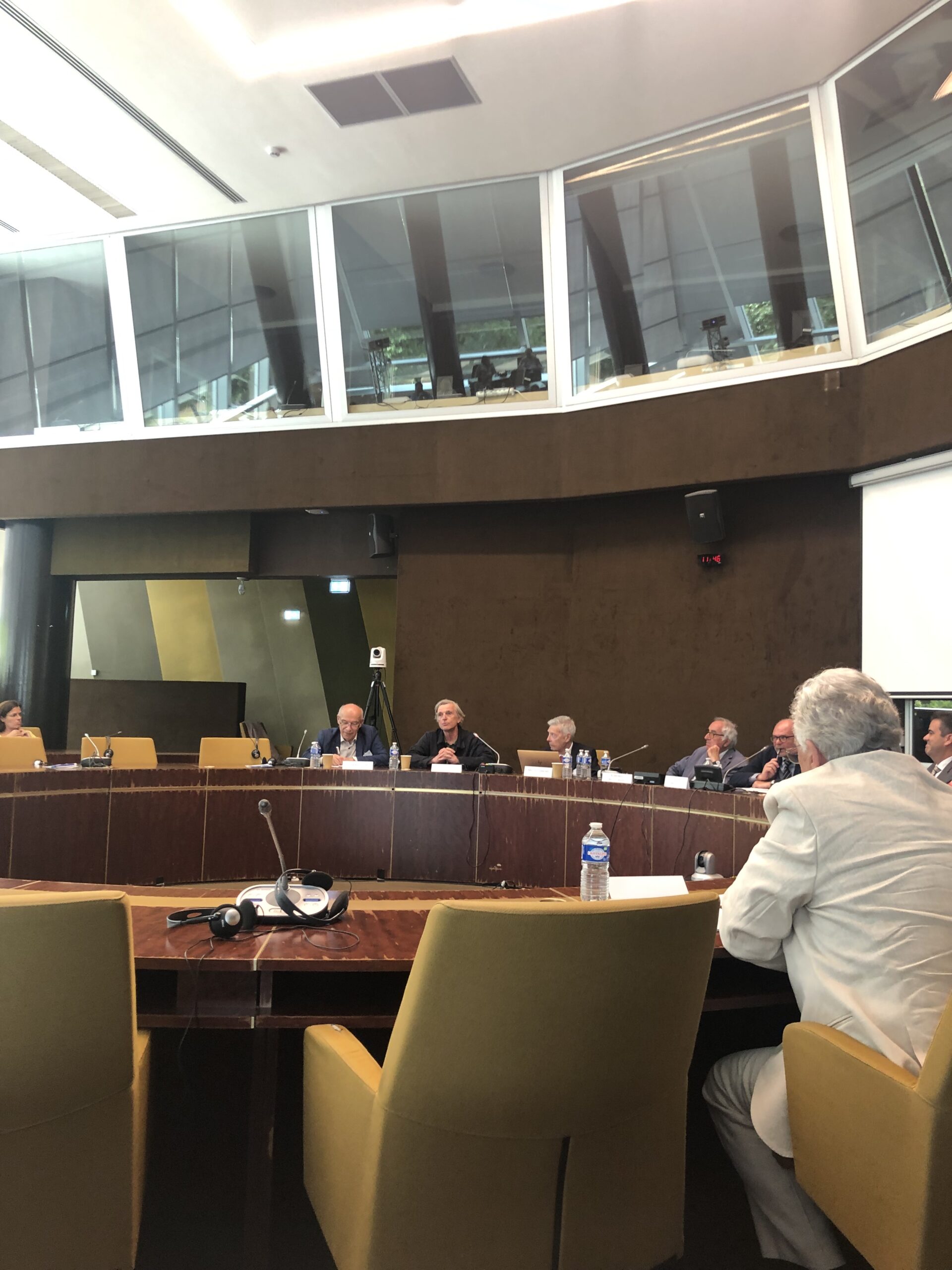Speech by Simone GABORIAU
Propos d’ouverture
Simone GABORIAU CO-FONDATRICE DE MEDEL,
ancienne présidente du Syndicat de la Magistrature
“Nous voulions faire galoper l’histoire”
Ce n’est pas sans émotion forte que, ce matin, en présence de vous toutes et tous les plus hautes personnalités de l’Europe qui nous honorez de votre présence, j’évoque une histoire sans pareil celle, en juin 1985, de la création de MEDEL, Magistrats Européens pour la Démocratie et les libertés ; je présidais alors le Syndicat de la Magistrature (SM) l’une des organisations fondatrices.
Une salle de ce palais du Conseil de l’Europe, avait été mise à notre disposition avec une équipe de traducteurs. Nous vous sommes reconnaissants d’un tel accompagnement efficace !
Dans la suite de la déclaration universelle des droits de l’homme de 1948, le conseil de l’Europe fondé un an plus tard, avait initié la signature de la Convention européenne de sauvegarde des droits de l’homme et des libertés fondamentales, premier traité européen imposant à chaque Etat partie, des obligations à l’égard de la personne humaine, avec grâce à la création de la Cour Européenne des droits de l’homme la possibilité de faire condamner un Etat défaillant. René Cassin inspirateur de ces déclarations en fut le deuxième président.
Rappelons qu’après la barbarie nazie à laquelle le régime fasciste italien s’était associé, l’état de droit démocratique était né comme une promesse de l’aube après la seconde guerre mondiale. Ainsi se construisait et s’internationalisait une nouvelle culture juridico-judiciaire. S’organiser autour du respect des droits fondamentaux garanti par une justice indépendante était devenu un impératif catégorique.
Nous étions une petite vingtaine de magistrats européens engagés en ce sens, pionniers du syndicalisme et de l’associationisme judiciaires et voulant briser le conformisme judiciaire hélas dominant.
En ce mois de juin 1985, dans le contexte d’une guerre froide apparemment sans fin, nous représentions 6 pays de l’Europe occidentale Allemagne (RFA) Belgique, Espagne, France, Italie, Portugal.
Comment étions-nous parvenus à une telle mobilisation ?
L’occident, il faut le rappeler, n’était pas exempt de dictatures, en Amérique Latine et en Europe : Grèce, Espagne et Portugal. Dans un tel contexte, des magistrats progressistes attachés au respect des droits fondamentaux tissèrent des liens discrets avec des magistrats opposant à ces régimes.
C’est ainsi que dans les années 1970, sous l’impulsion des premières associations progressistes fondées en 1964 Magistratura Democratica et 1968 Syndicat de la Magistrature, s’était créé un mouvement européen informel de magistrats, grâce à des contacts noués avec des juristes et des juges internationalistes, comme Louis Joinet, fondateur du SM, ainsi que des survivants de la résistance aux dictatures.
L’installation progressive de régimes démocratiques dans toute l’Europe occidentale fit naitre des réflexions communes sur l’enjeu démocratique du pouvoir judiciaire et sa place dans nos différents pays.
Cela conduisit à l’organisation à Lille en février 1983, d’un colloque sur le thème Magistrature et Démocratie. Suivie d’un ouvrage, Être juge demain, cette première rencontre internationale fut un moment initiatique de la parole critique de magistrats sur un tel thème.
Quelques mois plus tard, en octobre 1983, à Bordeaux, une réunion aboutit à une déclaration commune. Ce fut le premier texte, signé par des organisations de magistrats, définissant, au sein de l’Europe, les exigences d’une justice démocratique, fondée sur la séparation des pouvoirs, la garantie des droits humains ainsi que l’attachement à un fonctionnement judiciaire équitable assurant la protection des plus faibles.
En dix-huit mois de maturation, un projet de statuts fut conçu, portant création d’une “association d’organisations de magistrats” qui avait déjà la dénomination “Magistrats européens pour la Démocratie et les Libertés”. On le discuta à Bruxelles le 1er mars 1985, à l’occasion du congrès de l’Association syndicale des magistrats.
Et final solennel : les 15 et 16 juin 1985, les statuts sont adoptés à Strasbourg.
Je tiens à rendre hommage à nos compagnons de route participants actifs de ce processus créateur, qui nous ont quitté : nos camarades belge, allemand et italien : Christian Wettinck, premier président oh combien ardent et lumineux de MEDEL, Heinz Stözel président un peu plus tard alors qu’était entamée la transition démocratique de l’Europe, Salvatore Senese un de nos « pères fondateurs » de nos réflexions et constructeur de notre volonté d’agir.
Les statuts, trop long à lire, traduisaient la volonté de la défense de l’indépendance du pouvoir judiciaire, la promotion de l’Etat de droit démocratique et la construction d’un espace judiciaire européen fondé sur la garantie des libertés et droit fondamentaux, en matière politique comme économique et sociale.
Dans le contexte actuel de certaines critiques infondées de la Cour Européenne, critiques révélatrices de la montée en puissance d’une rhétorique hostile à l’état de droit, je citerai uniquement l’un des objectifs de cette nouvelle association : « La proclamation et la défense des droits des minorités et des différences, notamment des droits des immigrés et des plus démunis, dans une perspective d’émancipation sociale des plus faibles. »
Impossible de répondre mieux à ces critiques que le président de la Cour, Mattias Guyomar “En contribuant à la protection de l’État de droit, les juges font vivre la démocratie. Cela signifie que la volonté de la majorité ne doit pas aboutir à nier les droits de la minorité ou des minorités” .
De telles déclarations convergent avec les objectifs qui nous animaient en ces journées mémorables.
Il en est de même de celles de Jean Paul Costa, qui écrivait, en 2018 dans un livre consacré à la situation turque
« C’est précisément parce que rien n’est jamais acquis que les droits et libertés sont partout et toujours à reconquérir que le devoir de vigilance est pressant et nous oblige »
Dans ce palais du Conseil de l’Europe j’ai, aussi, au nom de MEDEL représenté Murat Arslan lauréat le 9 octobre 2017 du prix Vaclav Havel des droits de l’homme. Fait sans doute sans précédent : un juge, un juge turc, recevait ce prix pour sa lutte infiniment courageuse et sans concession en faveur de l’indépendance de la justice.
J’ai avec une émotion qui m’habite encore, lu devant les parlementaires de 47 pays présents dans
l’hémicycle du Conseil de l’Europe le texte de remerciement qu’il avait réussi à nous faire parvenir : Quelques extraits repris le lendemain par le Monde
« Je m’adresse à vous depuis une prison dans un pays où le droit est mis entre parenthèses, où les valeurs de la démocratie s’éloignent progressivement, où les voix dissidentes sont étouffées, où les défenseurs du droit, les journalistes, ceux qui souhaitent la paix, ceux qui crient pour que les enfants ne meurent pas, sont décrétés “terroristes” (…) Ce prix que nous payons sert à renforcer notre croyance et notre envie de nous battre en faveur des valeurs du droit et de la démocratie. »
Arrêté le 19 octobre 2016, Murat Arslan a subi le poids de 3149 jours de détention après avoir été condamné de façon inique à 10 ans d’emprisonnement pour « terrorisme » ; « terrorisme » alors qui défendait l’indépendance de la justice !
Il continue courageusement à poursuivre, de sa prison de SINCAN, son combat pour l’indépendance de la justice.
Et 40 ans après sa création, MEDEL s’émeut avec force face à tant de courage !
Sans avoir imaginé qu’un jour nous aurions à soutenir un collègue, un camarade confronté à de telles injustice et persécution, nous voyons dans ce combat la force de nos volontés de l’époque.
Alors seule existait l’UIM, créée en 1953, sa composante européenne étant instituée plus tard.
Les caractéristiques de MEDEL étaient de rassembler des magistratures engagées conscientes, entre autres, de la nécessité d’une ouverture de la justice sur la société et voulant rompre avec le conservatisme et le conformisme judiciaires. Nous voulions à cette fin rendre public le regard d’acteurs judiciaires de terrain, à l’esprit critique aiguisé par leur engagement, regard susceptible d’aiguillonner les analyses des institutions européennes sur le fonctionnement des Etats et de leurs systèmes judiciaires.
MEDEL a impulsé une société civile des juges et procureurs.
Nous voulions faire galoper l’histoire de l’Europe des juges et des procureurs, l’histoire de leur conscience active.
40 ans après, à vous toutes et tous d’apprécier !
Strasbourg le 3 juin 2025
Download the speech (.pdf)
Speech by Mariarosaria GUGLIELMI
Opening speech by Mariarosaria Guglielmi
President of Medel
From Medel’s visionary project of a united Europe built on peace, democracy, rule of law, and solidarity to the challenges we face in defending our common values
Your Excellencies,
Minister for Justice of Malta,
President of the European Court of Human Rights,
Director of the EU Agency for Fundamental Rights,
it is a real privilege to have you here today. On behalf of MEDEL, I warmly welcome and thank you for honouring with your presence the celebration of our anniversary.
We are grateful to the Minister for Justice and the Ambassador Permanent Representative to the CoE for the privilege of holding our event during the Council of Europe Presidency of Malta.
A warm welcome as well to all our distinguished speakers, participants, colleagues and friends.
We are specially honored by the presence of His Excellency the Attorney General of Spain.
I wish to warmly thank Justice Francesco Depasquale, Muriel Decot, Giuliana Civinini, the whole CEPEJ Secretariat for the support in organising the conference in a venue that is the ultimate symbol of our shared values: peace, democracy, fundamental rights, solidarity.
When our continent was still divided by the Berlin Wall, a small group of visionary judges and prosecutors gathered here to establish MEDEL. They had indeed in mind Europe as a community united not only by the market but by a process of political, social, and legal integration (art. 2 Statutes). A process this to be actively supported by judges.
They represented the few progressive associations of magistrates of the time, that openly declared – starting from their names (Magistratura democratica, Juezas y Jueces para la Democracia, Unión progresista de fiscales) – a commitment to democracy in dealing with the internal and external challenges experienced by the judiciary. A commitment that was the fuel for an intense debate, the conclusion of which was that defending democracy required judicial systems with well rooted democratic features. This implied starting from new concepts of legitimacy and judicial independence, that served not only to protect judicial systems against external interferences, but also to act as catalysts of their internal democratisation.
The judges and prosecutors serving in this new dimension had to be “endowed with ubiquity: one foot in the local and the other in the universal”, as Christian Wettinck, first president of MEDEL, said of our founding fathers Salvatore Senese (representative of Magistratura democratica) and Louis Joinet (representative of the French Syndicat de la Magistrature). These visionary judges inspired a new model of judicial association, actively engaged in the democratic debate. And they proposed a “new identity” for judges, that they perceived as required by the paradigm shift implied in the adoption of our fundamental charters and in the establishment – in reaction to totalitarian regimes – of constitutional and supranational courts: the identity of “European magistrates”, well described in MEDEL’s statutes (judges and prosecutors committed to promoting and defending “the values of the democratic rule of law”, a “democratic legal culture”, and fundamental rights, especially those of minorities and migrants, “in a perspective of social emancipation of the most vulnerable”).
It is crucial to stress that, since its foundation, MEDEL has been much more than just a network connecting different associations. It indeed actively contributed to the establishment of a European legal space “not bureaucratic nor police-based” – as Christian Wettinck said – but a “European judicial space of friendship”.
MEDEL’s community currently comprises 25 judicial associations from 17 countries of the Council of Europe and– through dialogue and solidarity- brings judges and prosecutors together, far beyond European borders. I wish to warmly thank our colleagues who have joined us today from Morocco and Guinea. A very warm welcome goes to our colleagues from Afghanistan. Please feel sure that MEDEL will keep its commitment in supporting all those judges, prosecutors, lawyers (especially women) who- after the Taliban takeover- were forced to flee their country or live under constant risks because of their commitment to the rule of law.
MEDEL has always been a sentinel, spotting at a very early stage dangerous developments for the rule of law in national contexts and alerting European institutions. We witnessed dramatic events such as the mass arrests and dismissals of our colleagues in Turkey after the attempted coup d’état. We continue to monitor and to denounce the collapse of rule of law and democracy in that country. We can feel today the presence of Murat Arslan, president of YARSAV, unjustly detained since October 2016, who in this Palace was awarded in 2017 the Václav Havel Prize for his commitment to justice and human rights. It is with deep emotion that I welcome our Turkish colleagues who courageously shared their touching experiences and bear witness to the events that affected thousands of magistrates, lawyers, human rights defenders. Their ordeals will not be forgotten.
The awareness of being “European judges”, and to have to act accordingly, which we owe to MEDEL, supported the resilience of independent justice in contexts where rule of law backsliding led to a firm grip of the executive power over the judiciary. By relying on this awareness, despite the muzzle law, the harassment with disciplinary and criminal sanctions and smear campaigns, Polish judges continued their “dialogue” with European Courts. By doing so, they reaffirmed the primacy of European law and of the fundamental principles that are part of European identity.
The awareness of being members of a community founded on universal values is today the best support to the resilience that independent Justice needs in the face of the existential global threats to the rule of law, democracy and international justice system, represented by the populist authoritarian drift that seeks to dismantle all boundaries to the exercise of sheer power. A process that has changed, in the space of a few days, the course of history in countries celebrated as well-established models of democracy.
The wide-ranging perspective provided by MEDEL’s observatory made us aware that the attacks against independent judiciary are always part of a broader project, where curbing the rules and mechanisms of democracy is only a first step, eventually functional to regressive policies on rights and freedoms. What we can clearly observe is the project of a new order, no longer based on equality in rights and dignity, but rather on exclusion and identity: a new order that aims to subvert the very idea of Europe as a community based on the primacy and universality of human rights, with a national and supranational judicial architecture to guarantee their effective protection.
A Europe of peace, solidarity and the rule of law: this was the idea to be realised– in Christian Wettinck’s words[1]– that inspired the visionary project behind MEDEL; this is today the perspective we must defend.
The challenges for rule of law and democracy have become increasingly dramatic and complex. The condition of migrants is, in our experience, the litmus test for European values. It is indeed in the context of migration policies that we are facing what has been described as an emerging pattern of decline amongst established liberal democratic constitutional orders in their commitment to human rights and rule of law.
MEDEL always called upon Europe and Member States to ensure a system for the reception of migrants in line with human rights protection standards. For MEDEL, it is essential to reflect on what we mean by “rule of law” in the face of national and European migration policies, that too often blatantly conflict with fundamental values. In the field of migration we are experiencing the fastest growth of institutional intolerance towards the role of the judiciary as impartial guarantor of fundamental rights. It is primarily on migration issues that the populist rhetoric aims to delegitimize judges, labelling them as enemies of the people, solely based on decisions that refer to supranational sources to protect individuals. Around migration we are now witnessing what the Italian scholar Luigi Ferrajoli has called “l’ostentazione istituzionale della disumanità” (inhumanity flaunted by state institutions).
MEDEL made us fully aware that our common values can be overturned anytime.
Not even our visionary founding fathers could have imagined such dark times for Europe and democracy: old demons are back, with their symbols and language. The demons of war are back, with escalating atrocities and mass human rights violations we never thought we would see again.
The way forward looks increasingly narrow and challenging. But MEDEL still provides us with a compass.
Our task today is to stick to our values, to reaffirm and defend them, to safeguard for everyone the achievements represented by our Charters, the European Convention on Human Rights above all.
I wish to close by quoting the recent words of the Secretary General of the Council of Europe:
“As we face today’s complex challenges, our task is not to weaken the Convention, but to keep it strong and relevant to ensure that liberty and security, justice and responsibility, are held in balance. That is the legacy we inherit. And it is the duty we share”[2].
[1] C.Wettinck,”Medel: dall’idea alla realizzazione”, Questione Giustizia, n. 6-2000.
[2] https://www.coe.int/en/web/portal/-/alain-berset-on-the-joint-letter-challenging-the-european-court-of-human-rights
Download the speech (.pdf)
Speech by Sirpa Rautio
Speech given by Sirpa Rautio
Director of the European Union Agency for Fundamental Rights – FRA
It is testament to the high regard in which MEDEL is held to see so many people gathered here today to celebrate this important milestone, 40 years in the making. I wish to congratulate MEDEL on this special occasion.
This occasion has brought us all together at a time of challenges and concern for fundamental rights, rule of law and democracy, and I am honoured to be here to provide the perspective of the EU Agency for Fundamental Rights. FRA is the EU’s independent human rights agency. We are mandated to safeguard the rights, values and freedoms enshrined in the EU’s Charter of Fundamental Rights.
Our priorities reflect the many challenges faced by the EU, its Member States, and its citizens. We address racism, inequality, discrimination, antisemitism and anti-Muslim hatred. We work on topics in which rights have been enshrined, but are not fully enjoyed, like disability, child protection, and access to justice. We have found in recent years that, as the world moves with societal advancements and new technologies, there is a gap in knowledge as to the relationship of these developments and fundamental rights. FRA continues to make the case for the respect of human rights.
Our data clearly show that human rights violations persist. We see in our surveys the profound fear and concern with which people now live their lives in our societies. In FRA’s report on Jewish People’s Experiences and Perceptions of Antisemitism, 80% of respondents felt that antisemitism has grown in their country in the five years before the survey. It is important to note that this data was collected prior to the 7 October Hamas attacks – and still we see the increases.
Racial discrimination was experienced by almost half of people of African descent in FRA’s report ‘Being Black in the EU’. This number reached as high as 76%, depending on the Member State. The 10,000 Muslims we surveyed in 2022 all had examples of racism and discrimination to offer, in schools, workplaces, and on our streets.
Yet despite the evident inequalities, the trust required to report harassment, violence and discrimination to the relevant authorities is severely damaged, or perhaps never existed. Of the one third of people who experienced racist harassment, 87 % did not report the incident to any authority or service. Nearly half of these respondents felt that nothing would change if they reported the incident. Among those who did report, 76 % were unsatisfied with how their complaint was handled. This raises the question: how effective are our processes around access to justice?
This trend was also seen with victims of gender-based violence, 13.5% of whom reported the physical and sexual violence and threats they had experienced. Despite many national and European legal developments, such as the Istanbul Convention and the EU’s directive on combating violence against women and domestic violence, almost nothing has changed since FRA first collected this data in 2014; it is still the case that one in three women in the EU-27 has experienced physical violence or threats and/or sexual violence over their lifetime.
Groups in vulnerable positions in our societies continue to be pushed further to the margins. The number of persons with disabilities living in institutions is increasing, despite promises around independent and community living. For member of our LGBTIQ communities, violence, harassment and bullying have had a devastating effect on mental health. The Roma and Traveller community – the largest single minority on the European continent – experiences continuous patterns of discrimination, harassment, and exclusion.
Alongside these shortcomings in protecting people’s rights, we see new manifestations that we must learn to contend with. Hate and harassment has moved online. Although the emergence of online platforms and social media has transformed modern communication, so too has it amplified expressions of hate. Disinformation is rampant, and it results in growing suspicion in society, decreasing faith in established institutions and a blind embrace of those sowing seeds of malice and division.
This division is fed by uncertainty, and there is no doubt that we live in uncertain and precarious times. We witness inflammatory rhetoric spouted by leaders every day, wars on our borders, and continued and blatant acts of aggression in one of our neighbouring countries, Ukraine.
In times of uncertainty, we need stable institutions and agreed norms. However, we also see challenges here. The Rule of Law Index 2024, which is carried out by the World Justice Project annually and measures the rule of law in 142 countries and jurisdictions, shows that, for the seventh year in a row, the rule of law has declined globally. Over 6 billion people now live in countries where rule of law is weaker than it was in 2016.
Here in Europe, there are worrying indicators, pointing to the erosion of the rule of law. I see it at the EU’s external borders, where people are pushed back by border guards, with little to no accountability. I hear it, when politicians speak words of hate and exclusion, without impunity. Human rights defenders tell me of the pressure – even danger – they come under where their cause is not locally popular.
This, alongside increasingly loud and pervasive views in the EU (and worldwide) that human rights are alternatives or options, rather than legal obligations, sends a clear signal to society that the law no longer rules. We must stand firm in the face of this dissent. Our collective achievements, reflected in the European Convention on Human Rights and the Charter of Fundamental Rights, have seen politicians and governments come and go, and they remain the bedrock of the equal and inclusive societies we strive to achieve.
Allow me a moment to discuss fundamental rights in the specific area of migration. I do this because, amidst the din of political jargon and populist trends, we must never forget the individual at the centre of these divisive discussions.
Since 2014, over 32,000 deaths or disappearances have been recorded in the Mediterranean. This is devastating in any light, but even more so when we consider that the law cannot be clearer: our States have an indisputable duty to save the lives of those arriving at our borders. For a number of years now, my Agency has considered what can be done to reduce the staggering number of rights violations suffered by migrants and asylum seekers. Briefly, these include:
- First, simply save lives. Where they cannot do this effectively alone, they should support any legitimate efforts of civil society. Instead, as my Agency has reported, NGOs face delays, barriers and attempts to criminalise search and rescue efforts in the Mediterranean Sea. A distinction must be made between persons smuggling and trafficking and those honouring the human rights imperative – and duty – of saving lives at sea.
- Secondly, safe and legal pathways to seek asylum in Europe would save lives and greatly reduce the desperate need to resort to smugglers to reach Europe. Moreover, this would render the right to asylum – protected by Article 18 of the EU Charter of Fundamental Rights – a reality for refugees and other persons in need of protection.
- Next, despite the enshrined right to seek asylum, legal restrictions persist that permit the apprehension and immediate summary return of those entering a country by circumventing border controls, without an individual examination of a person’s situation. It is necessary to review all such legal provisions in light of international and EU law and jurisprudence. Law reform may be challenging, especially in contexts of divisive politics, but it is essential to the rule of law that States are committed to upholding universal values as reflected in the EU Treaties and the rulings of international courts.
- In addition, it is important to acknowledge that the right to asylum is not automatic and only extends to those who qualify for international protection. Where asylum is not granted, the result should be the safe and dignified return of the person in question. The duty upon States to provide safe, rights-respectful forced returns is explained in a recent FRA paper on Return Hubs.
- Finally, EU monitoring of fundamental rights must be strengthened, and where countries fail to prevent violations, investigations must be thorough, timely and effective.
To conclude – I very much look forward to listening to interventions and discussions over the course of the day. I am convinced that I will return to Vienna armed with promising practices and inspiring ideas which can only enhance our work.
Thank you.
Download the speech (.pdf)
Speech by Jonathan Attard
Speech given by Dr Jonathan Attard
Minister for Justice and Reform of the Construction Sector
Mr President of the European Court of Human Rights,
Excellencies,
Esteemed Colleagues,
Members of the Judiciary, Prosecutors, and Legal Professionals,
Distinguished guests,
It is a privilege and an honour to address you today on the occasion of MEDEL’s 40th anniversary, a remarkable milestone for an organisation.
A network that, since 1985, has united judges and prosecutors across borders in a common cause, that has stood as a guardian of democracy, a defender of the rule of law, and a voice for judicial independence across Europe.
Allow me, first and foremost, to extend Malta’s sincere appreciation for MEDEL’s work over the past four decades.
Since its establishment MEDEL has become a vital platform for fostering dialogue, solidarity, and a shared commitment to democratic values.
Your advocacy, particularly during difficult times in our shared European history, has reminded us all that judicial independence is not just a principle on paper, but it is a living cornerstone of free societies.
Over the years, MEDEL has given a voice to judges and prosecutors who have faced threats, intimidation, or political interference.
This was done with courage and clarity, always guided by the values of tolerance.
In my capacity as Minister for Justice, on behalf of the Government and the people of Malta, I thank you and extend my heartfelt congratulations to MEDEL for four decades of leadership.
Let us not ignore the scale of today’s challenge.
Across our continent, we are witnessing democratic backsliding.
The judiciary is being politicised; the rule of law is being undermined; and citizens are losing faith – not only in the fairness of systems, but in democracy itself.
This crisis of trust is perhaps our greatest challenge.
Rebuilding it cannot be done with words alone. It requires strong institutions; independent courts; transparent governance; and above all, it requires the courage to stand up, as MEDEL has done, when those principles are under threat.
In Malta, we’ve taken this challenge seriously.
We are firmly convinced that an independent, impartial and effective judiciary is the bedrock of democracy.
It is the guarantee of equality before the law, the guardian of rights and liberties and the ultimate arbiter of justice.
In recent years, Malta has undertaken significant reforms to strengthen our justice system, driven by both internal reflection and constructive engagement with European institutions.
Following the recommendations of the Venice Commission in 2018 and 2020, Malta launched an ambitious programme of Constitutional and institutional reforms.
These reforms were rooted in a genuine desire to improve transparency, increase accountability and ensure the full independence of the judiciary.
In 2019, we established the Court Services Agency, an important step that has further supported the judicial system in Malta.
This Agency was created with the purpose of assisting the Bench, and today it stands as a crucial administrative backbone to the courts.
From courtroom management to digitisation initiatives, the Agency provides comprehensive support, allowing members of the judiciary to focus solely on their Constitutional role.
Between 2023 to date, the number of administrative staff within the Agency grew by more than 15%, reaching over 570 individuals. Around 100 of them are legal professionals assisting the judiciary as Court Attorneys and Judicial Assistants.
Premises management has also been prioritised as have victim-support facilities.
In parallel, there has been a drastic increase in the number of members of the judiciary.
Over the past five years, we have seen a steady annual rise, from 43 members in 2020 to 59 this year. An overall increase of over 37 percent.
In fact, just weeks ago, two newly appointed Magistrates have been sworn in, and in the previous year, four new Magistrates were assigned specifically to undertake magisterial inquiries, supported by dedicated resources and premises.
These structural improvements have been matched by reforms in remuneration.
Recently, we introduced a new agreement for the judiciary to significantly improve the compensation and conditions of service for Judges and Magistrates, as well as for the Attorney General, and the State Advocate.
This reflects our belief that proper remuneration is a necessary element of judicial independence and integrity.
One of the most important steps we took was reforming the process of judicial appointments. The Judicial Appointments Committee has been strengthened and made more independent, ensuring merit-based selection.
Furthermore, the role of the President of Malta in appointing judges was redefined to reinforce separation of powers.
As for the appointment of the Chief Justice, we are currently discussing in Parliament a constitutional amendment that will formally require consultations with the current Chief Justice before any new appointment is made.
This is a reflection of our continued efforts to enhance judicial independence and transparency.
Importantly, as part of our reform efforts we maintain regular and constructive dialogue with the Judiciary Association, the independent body representing Judges and Magistrates in Malta.
This ongoing engagement ensures that reforms are informed by the experience and perspectives of the judiciary itself.
Finally, let me take a moment to acknowledge the recently announced package of constitutional amendments, tabled in Parliament, aimed at further improving efficiency and strengthening standards in the justice sector.
These amendments include, among others, introducing a Commissioner for Standards of the Judiciary.
The Commissioner will be appointed by the Commission for the Administration of Justice, which is chaired by the President of the Republic and the majority of members are members of the judiciary.
Thus, the Commissioner will be an independent body, with no control from the Government or influence from any politician.
These proposals are the product of long-standing consultations with the Judiciary, which resulted in an agreement on the principles in relation to disciplinary and ethics standards.
This is a testament to our government’s belief that judicial independence must go hand-in-hand with transparency, accountability, and public trust.
Our reform process has not taken place in isolation.
Malta has worked closely with various European institutions, including the Venice Commission, the European Commission and GRECO, whose guidance and oversight have been invaluable.
We remain committed to open dialogue and peer review as essential tools to build better justice systems.
As we look forward, Malta stands fully in support of judicial integrity and ongoing training, particularly in digital justice, human rights and the rule of law.
MEDEL’s role in promoting cross-border dialogue and peer support remains invaluable in these efforts.
Let us continue to work together, to stand firm in the face of threats to judicial independence, be it from within or beyond our borders, and to reaffirm our collective commitment to the values that bind us as Europeans.
Once again, I congratulate MEDEL on this remarkable 40-year journey.
May your voice continue to inspire, to challenge and to defend democracy.
Thank you.
Download the speech (.pdf)


